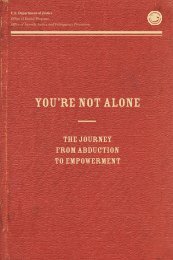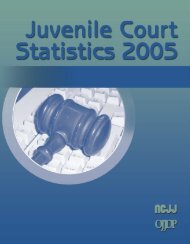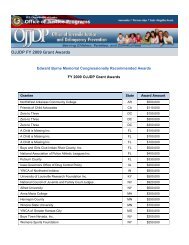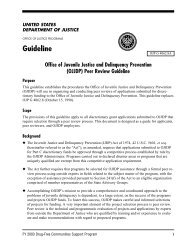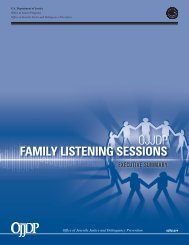OJJDP National Conference Program - Office of Juvenile Justice ...
OJJDP National Conference Program - Office of Juvenile Justice ...
OJJDP National Conference Program - Office of Juvenile Justice ...
Create successful ePaper yourself
Turn your PDF publications into a flip-book with our unique Google optimized e-Paper software.
U.S. Department <strong>of</strong> <strong>Justice</strong><strong>Office</strong> <strong>of</strong> <strong>Justice</strong> <strong>Program</strong>s<strong>Office</strong> <strong>of</strong> <strong>Juvenile</strong> <strong>Justice</strong> and Delinquency Prevention<strong>OJJDP</strong>’S NATIONAL CONFERENCEOctober 12–14, 2011Gaylord <strong>National</strong> Hotel & Convention Center<strong>National</strong> Harbor, Maryland<strong>Office</strong> <strong>of</strong> <strong>Juvenile</strong> <strong>Justice</strong> and Delinquency Preventionojjdp.gov
Provide your feedback on<strong>OJJDP</strong>’s <strong>National</strong> <strong>Conference</strong>Children’s <strong>Justice</strong> & Safety: Unite, Build, LeadScan this QR code to access <strong>OJJDP</strong>’s 2011 <strong>National</strong> <strong>Conference</strong> evaluationforms or navigate to surveys.nttac.org/<strong>OJJDP</strong><strong>Conference</strong>Feedback. Forinstructions on how to download a QR Code reader, visit the conferenceWeb site at ojjdp.gov/2011conference.Sign Up for <strong>OJJDP</strong>’s Online ResourcesJUVJUST e-mails information several times per week from <strong>OJJDP</strong> and the fieldabout new publications, funding opportunities, and upcoming conferences.<strong>OJJDP</strong> News @ a Glance, an electronic newsletter published every 2 months,covers many <strong>of</strong> the same topics as JUVJUST—plus recent <strong>OJJDP</strong> activities—but in more depth.It’s easy:Go to ojjdp.gov, look for JUVJUST and News @ a Glance, and click “Subscribe.”Or you can use your mobile device to scan the QR codes below.JUVJUSTNews @ a Glance
U.S. Department <strong>of</strong> <strong>Justice</strong><strong>Office</strong> <strong>of</strong> <strong>Justice</strong> <strong>Program</strong>s<strong>Office</strong> <strong>of</strong> the Assistant Attorney GeneralWashington, D.C. 20531Dear <strong>Conference</strong> Attendees:On behalf <strong>of</strong> the <strong>Office</strong> <strong>of</strong> <strong>Justice</strong> <strong>Program</strong>s (OJP), I am pleased to welcome you to the <strong>Office</strong> <strong>of</strong> <strong>Juvenile</strong><strong>Justice</strong> and Delinquency Prevention’s (<strong>OJJDP</strong>’s) <strong>National</strong> <strong>Conference</strong>, “Children’s <strong>Justice</strong> & Safety: Unite,Build, Lead.”One <strong>of</strong> my top goals for OJP continues to be to strengthen our partnerships with state, local, and tribal justicestakeholders. Nowhere is this more important than in the fields <strong>of</strong> juvenile justice and child protection. Thisconference, which brings together juvenile justice researchers, practitioners, policymakers, and advocatesfrom across the country, is an important step toward achieving this goal. From prevention programs to deependintervention to child victimization, we have much to share and learn from each other.As you browse the agenda that follows, you will note a broad range <strong>of</strong> topics and sessions that will be <strong>of</strong>interest to all participants. In particular, I would highlight some <strong>of</strong> our new Departmentwide initiatives inwhich <strong>OJJDP</strong> plays a significant role, specifically the Defending Childhood initiative and the <strong>National</strong> Forumon Youth Violence Prevention. Both <strong>of</strong> these efforts demonstrate that establishing strong partnerships acrossgovernment and with local communities can ultimately improve the systems and services that impact ourchildren’s lives.I am also gratified to see that this agenda reflects OJP’s ongoing emphasis on the importance <strong>of</strong> data-drivenstrategies and evidence-based approaches. I firmly believe that applying rigorous scientific methods tounderstand what works is the best tool we have to make good use <strong>of</strong> our limited resources. I applaud thejuvenile justice field for leading the criminal justice community in its willingness to assess programs andpractices and make adjustments based on what the science tells us.This conference promises to provide you with a wealth <strong>of</strong> information and resources; however, I wouldbe remiss not to acknowledge that there is as much or more to learn from your fellow colleagues. It is arare opportunity to be among so many individuals working in similar areas on similar problems and withsimilar goals, so I encourage you to seek out new partners and new ideas to take back to your work andyour communities.Warm regards,Laurie O. RobinsonAssistant Attorney General
Dear <strong>Conference</strong> Attendees:On behalf <strong>of</strong> the <strong>Office</strong> <strong>of</strong> <strong>Juvenile</strong> <strong>Justice</strong> and Delinquency Prevention (<strong>OJJDP</strong>), welcome to our national conference, “Children’s<strong>Justice</strong> & Safety: Unite, Build, Lead.”More than 5 years have passed since <strong>OJJDP</strong> last held a national conference <strong>of</strong> this magnitude, and much has happened in thejuvenile justice field during that time. This conference will provide a snapshot <strong>of</strong> where juvenile justice is today. During the next2½ days, you will learn what the latest research and evaluation findings are telling us, see how communities are investing in promisingpractices and programs, and examine the dominant and emerging issues <strong>of</strong> our time, all <strong>of</strong> which will help develop a vision toaddress the challenges that lie ahead.<strong>Conference</strong> participants will learn how communities generate solutions and how individuals and groups make a difference in theirown neighborhoods. Working together, individuals, groups, and communities can make real and sustained changes. You will hearabout major Department <strong>of</strong> <strong>Justice</strong> initiatives such as Defending Childhood and the <strong>National</strong> Forum on Youth Violence Prevention,in which communities are developing effective responses to children’s exposure to violence and youth violence. We have invitedtop experts to discuss anti-gang strategies, juvenile <strong>of</strong>fending, truancy, mentoring, bullying, and youth violence, among many otherissues. There is literally something here for everyone in the juvenile justice field.We have planned many special events during the conference. Attorney General Holder will provide comments following a TownHall meeting featuring leadership from Department <strong>of</strong> <strong>Justice</strong> funding agencies. Former New York Yankees manager Joe Torre willdiscuss his work with the child victims <strong>of</strong> domestic violence. We will unveil a new disaster planning guide for juvenile facilities.Missing children’s activist Elizabeth Smart will address the conference, as will top congressional leaders and federal government<strong>of</strong>ficials.This conference will provide you with the tools you need to help youth in your community to become productive, law-abidingcitizens; protect our children and teens and keep them safe; and deter delinquent and criminal behavior. Much has already beenaccomplished to improve the lives <strong>of</strong> our nation’s children, but much work remains to be done. By continuing to create partnershipsthroughout our government and communities, we can build on previous successes to provide our youth with opportunities for abetter tomorrow.Thank you again for joining us at this important event.Sincerely,Jeff SlowikowskiActing Administratoriii
Wednesday, October 12 (continued)Effective Partnerships for Catalyzing Change (Track: Engaging Funders)Chesapeake J–L12:00 p.m. – 1:45 p.m. Luncheon Keynote Potomac A–D2:00 p.m. – 3:30 p.m. Breakout SessionsThe Impact <strong>of</strong> Entertainment and Fashion on Young PeopleDr. Sharon Cooper, CEO <strong>of</strong> Developmental and Forensic Pediatrics, PA;University <strong>of</strong> North Carolina—Chapel Hill School <strong>of</strong> MedicineAGENDA AT A GLANCEAGENDA AT A GLANCEMini-PlenaryThe Real Deal: Girls and Trauma (Track: Girls at the Margin) <strong>National</strong> Harbor 2–3WorkshopsTribal Law and Order Act: How Does It Impact Youth in Indian Country?(Track: Trends in Tribal Youth Policy)<strong>National</strong> Harbor 4–5Looking at Family Drug Courts: Past, Present, and Future <strong>National</strong> Harbor 6Lesbian, Gay, Bisexual, and Transgendered Youth in the<strong>Juvenile</strong> <strong>Justice</strong> System<strong>National</strong> Harbor 10DMC Research and Evidence-Based Practices(Track: Disproportionate Minority Contact)Successful School Engagement and Reengagement Strategies(Track: Truancy and Dropping Out)Breaking the Cycle <strong>of</strong> Violence: Education Is the Answer—How Is the QuestionStrategies for Effective Investigation and Prosecution <strong>of</strong>Child Abuse Cases: An Overview <strong>of</strong> <strong>National</strong> Resources(Track: Protecting and Advocating for Children)Effective Youth Engagement and Best Practices for SustainingYouth Leadership<strong>National</strong> Harbor 11<strong>National</strong> Harbor 12–13Potomac 1–3Potomac 4–6Chesapeake 1–3The <strong>National</strong> Forum on Youth Violence Prevention Chesapeake 4–6What Can Research Teach Us About the Impact <strong>of</strong> Children’s Exposureto Violence? (Track: Defending Childhood)Law Enforcement and Youth Partnerships for Crime Prevention(Track: Law Enforcement Partnerships)Taking an Evidence-Based Approach to Everyday <strong>Juvenile</strong> <strong>Justice</strong>Practice (Track: Reconstructing the Ivory Tower)Chesapeake D–FChesapeake G–IChesapeake J–L3:45 p.m. – 5:15 p.m. Breakout SessionsWorkshopsSerious Adolescent Offenders Moving Into Adulthood: Life Events andthe Role <strong>of</strong> DeterrenceCreating Conditions for Learning: Stopping School Dropouts andImproving Graduation Rates (Track: Truancy and Dropping Out)<strong>National</strong> Harbor 4–5<strong>National</strong> Harbor 104
Thursday, October 13 (continued)What’s Happening Now With Information Sharing and <strong>Juvenile</strong> <strong>Justice</strong>?Business and Philanthropic Partners as Community Conveners DrivingSuccessful Advocacy Efforts (Track: Engaging Funders)Chesapeake G–IChesapeake J–L12:00 p.m. – 1:15 p.m. Working Lunch Potomac A–DAGENDA AT A GLANCEAGENDA AT A GLANCE1:30 p.m. – 3:00 p.m. Breakout SessionsPrevention and Intervention: Overcoming the Trauma <strong>of</strong> Children’sExposure to ViolenceJoe Torre, Chairman <strong>of</strong> the Board, Joe Torre Safe At Home ® FoundationMini-PlenaryDemystifying Philanthropy <strong>National</strong> Harbor 2–3WorkshopsThe West Side Story Project (Track: Law Enforcement Partnerships) <strong>National</strong> Harbor 4–5The <strong>National</strong> Survey <strong>of</strong> Children’s Exposure to Violence: An Update forPolicy and PracticeFederal Role in Equal Opportunity to Education and Access to <strong>Justice</strong>for <strong>Juvenile</strong> <strong>Justice</strong> System-Involved Youth<strong>National</strong> Harbor 6<strong>National</strong> Harbor 10Comprehensive Anti-Gang Strategies (Track: Anti-Gang Strategies) <strong>National</strong> Harbor 11Privacy: The Need To Know and the Need To Share <strong>National</strong> Harbor 12–13<strong>National</strong> Center for Youth in Custody (Track: Youth in Custody) Potomac 1–3Children’s Advocacy Centers: Multiagency Partnerships To ProtectChildrenChanging the Culture <strong>of</strong> Violence: A Neighborhood-Based Approach toCrime PreventionFollowing the Evolution: What Works, the Model <strong>Program</strong>s Guide, andCrimeSolutions.gov (Track: Reconstructing the Ivory Tower)The Invisible Population: Mothers in the <strong>Juvenile</strong> <strong>Justice</strong> System(Track: Girls at the Margin)Prevention and Intervention: Overcoming the Trauma <strong>of</strong> Children’sExposure to Violence; Showcasing Joe Torre’s Margaret’s Place(Track: Defending Childhood)Special Session: Introduction to Anti-Oppressive Practices(Note: This is a 3-hour workshop)Potomac 4–6Chesapeake 1–3Chesapeake 4–6Chesapeake D–FChesapeake G–IChesapeake J–L3:15 p.m. – 4:45 p.m. Breakout SessionsMini-PlenaryEmerging Local, State, and Federal Efforts To ImproveSchool Discipline Policies<strong>National</strong> Harbor 2–36
Thursday, October 13, 3:15 p.m. – 4:45 p.m. (continued)WorkshopsBest Practices for Supporting Children in <strong>Juvenile</strong> and Family Courts(Track: Protecting and Advocating for Children)<strong>National</strong> Harbor 4–5Sport-Based Youth Development <strong>National</strong> Harbor 6Promising Examples <strong>of</strong> Judicial Leadership To AchieveDeinstitutionalization <strong>of</strong> Status OffendersMoving Toward Best Practices for Mentoring: Recent and OngoingResearch on the Moderators <strong>of</strong> <strong>Program</strong> Effectiveness<strong>National</strong> Harbor 10<strong>National</strong> Harbor 11Adolescent Substance Abuse and Treatment <strong>National</strong> Harbor 12–13Ensuring Public Safety Through Successful Reentry—A DevelopmentalModel (Track: Youth in Custody)Collateral Consequences <strong>of</strong> Crime and the Expungement <strong>of</strong><strong>Juvenile</strong> RecordsA First Drink Before a First Breath: Fetal AlcoholSpectrum DisordersPotomac 1–3Potomac 4–6Chesapeake 1–3AGENDA AT A GLANCE5:00 p.m. – 6:00 p.m. WorkshopsStrength-Based Healing <strong>Program</strong>s for Native Girls(Track: Trends in Tribal Youth Policy)Strategies for YouthEvidence-Based Practices: A Call for Rigor in <strong>Program</strong>s(Track: Engaging Funders)Information Sharing: Lessons and Issues From the Field(Listening Session)State Roundtables (see page 25)Chesapeake 4–6Chesapeake D–FChesapeake G–IAzalea 3Potomac A–DFRIDAY, OCTOBER 14, 2011 — LEADPoster Session (see page 25)Exhibit Hall B8:30 a.m. – 12:00 p.m. General Session Potomac A–DRemarks and Introduction <strong>of</strong> Performers: Jeff Slowikowski,Acting Administrator, <strong>OJJDP</strong>Youth Performers: South Shore Drill Team and Performing Arts Ensemble,Chicago, IllinoisTown Hall Session: Children’s <strong>Justice</strong> and Safety: A Dialogue Withthe Leaders <strong>of</strong> DOJ’s <strong>Program</strong> <strong>Office</strong>s(Note: Questions will be taken from the audience)<strong>OJJDP</strong> <strong>Conference</strong> Award PresentationsChildren’s <strong>Justice</strong> and Safety: A Look AheadLaurie O. Robinson, Assistant Attorney GeneralR. Gil Kerlikowske, Director, <strong>Office</strong> <strong>of</strong> <strong>National</strong> Drug Control Policy (invited)Eric H. Holder, Jr., Attorney General7
WEDNESDAYOCTOBER 12, 2011 – UNITE8:30 A.M. – 10:15 A.M. OPENING CEREMONIES ANDWELCOMING REMARKSPOTOMAC A–DPresentation <strong>of</strong> ColorsJunior ROTC Honor GuardCrossland High SchoolTemple Hills, Maryland<strong>National</strong> AnthemWintley Phipps, CEO and FounderU.S. Dream AcademyPledge <strong>of</strong> AllegianceNyah AndersonBenjamin Orr Elementary Schooldevelopment and what can happen when drugs or alcoholare introduced to the brain during this process. Interventionsthat show the most promise will also be discussed.WorkshopsThe Legal Lives <strong>of</strong> Girls (Track: Girls at the Margin)<strong>National</strong> Harbor 4–5Francine Sherman, Boston College Law SchoolModerator: Catherine Pierce, <strong>OJJDP</strong>This workshop will provide practical information specific topolicies, practices, and processes that impact girls throughoutthe system, from arrest to commitment. Participantswill learn practical strategies for helping girls and familiesnavigate the legal system.Introduction <strong>of</strong> Dignitaries and Welcoming MessagesJeff Slowikowski, Acting Administrator<strong>Office</strong> <strong>of</strong> <strong>Juvenile</strong> <strong>Justice</strong> and Delinquency PreventionJames Cole, Deputy Attorney GeneralU.S. Department <strong>of</strong> <strong>Justice</strong>Congressman Chris Murphy (D-CT)5th DistrictIntroduction and Opening PresentationErnie Allen, President and CEO<strong>National</strong> Center for Missing & Exploited ChildrenElizabeth SmartPresident, Elizabeth Smart Foundation10:30 A.M. – 12:00 P.M. BREAKOUT SESSIONSMini-PlenaryDevelopment <strong>of</strong> the Adolescent Brain: These Are NotMiniature Adults<strong>National</strong> Harbor 2–3Randy Muck, Advocates for Youth and Family Behavioral HealthTreatment, LLCModerator: Gwendolyn Williams, <strong>OJJDP</strong>This session will explore the massive changes that theadolescent and young adult brain undergoes, how substanceuse can delay and impede necessary changes, and mostimportantly, what the court and treatment providers needto know to recognize the differences between normal brainCollaborative Leadership: Winning Ways for UnitingCommunities and Building Support for UnderageDrinking Prevention<strong>National</strong> Harbor 6Linda Chezem, Indiana UniversityBill Patterson, Pacific Institute for Research and EvaluationDr. Chris Spera, ICF InternationalModerator: Sharie Cantelon, <strong>OJJDP</strong>The panelists will discuss science-based practices, effectiveenforcement, policy-related strategies, and the importance<strong>of</strong> a comprehensive community approach, based on stateand local experiences and insights garnered from <strong>OJJDP</strong>’sEnforcing Underage Drinking Laws initiative. The sessionwill highlight collaborative leadership efforts that incorporatelaw enforcement, the courts, and the community to enforceunderage drinking laws, reduce youth access to alcohol, andreduce community health and safety problems. The panelwill also examine outcomes and lessons learned from thepartnership between selected civilian and military communitiesthat joined forces to combat underage drinking.Truancy Reduction and Prevention: King County,Washington, Models for Change Project(Track: Truancy and Dropping Out)<strong>National</strong> Harbor 10<strong>Justice</strong> Bobbe Bridge (retired), Center for Children and Youth <strong>Justice</strong>Leila Curtis, Truancy <strong>Program</strong>s, King County (Washington)Moderator: Susan Broderick, Georgetown UniversityAGENDA: WEDNESDAY, OCTOBER 129
AGENDA: WEDNESDAY, OCTOBER 12Wednesday, October 12, 10:30 a.m. – 12:00 p.m.(continued)This session will describe the Models for Change initiative inthe state <strong>of</strong> Washington and the emerging evidence-basedpractices from the four participating counties, with a majorfocus on the three-tiered model in King County (Seattle).Speakers will discuss their extensive truancy-prevention workwith schools and courts and their efforts to create truancyreductionprograms statewide through a pilot program. Thepresenters will share lessons learned and specific steps in developingpractices in which courts and schools work together.Disproportionate Minority Contact (DMC) andCultural Competency: A Sound Approach(Track: Disproportionate Minority Contact)<strong>National</strong> Harbor 11Rita Cameron-Wedding, California State University atSacramentoShalinee Hunter, <strong>Juvenile</strong> <strong>Justice</strong> Specialist, CaliforniaMark Soler, Center for Children’s Law and PolicyJames Bell, W. Haywood Burns InstituteModerator: Andrea Coleman, <strong>OJJDP</strong>This workshop will provide participants with an overview <strong>of</strong>the mechanisms that contribute to DMC in juvenile justice,focusing on differential <strong>of</strong>fending and treatment. Participantswill learn how to incorporate culturally competent strategiesinto their juvenile justice systems and youth-servingprograms.Not Your Mother’s Playground Bully: Responding tothe Nature and Consequences <strong>of</strong> Cyberbullying<strong>National</strong> Harbor 12–13Parry Aftab, Wired SafetySheriff Thomas G. Maurer, Wayne County, Wooster, OhioAnn M. Harkins, <strong>National</strong> Crime Prevention CouncilModerator: Karen J. Bachar, <strong>OJJDP</strong>This session will present key information on the factors thatcontribute to and prevent cyberbullying and strategies thatparents and school <strong>of</strong>ficials can use to prevent or amelioratethe problem. Presenters will also address how law enforcementresponds to this modern youth issue.What Data and Research Can—and Can’t—Tell UsAbout Tribal Youth Delinquency and Victimization(Track: Trends in Tribal Youth Policy)Potomac 1–3Julie Samuels, <strong>Justice</strong> Policy Center, Urban InstituteBill Adams, <strong>Justice</strong> Policy Center, Urban InstituteMelissa Sickmund, <strong>National</strong> Center for <strong>Juvenile</strong> <strong>Justice</strong>Alex Escarcega, Bureau <strong>of</strong> Prisons (on detail to the Bureau <strong>of</strong>Indian Affairs, <strong>Office</strong> <strong>of</strong> <strong>Justice</strong> Services)Moderator: Howard N. Snyder, Bureau <strong>of</strong> <strong>Justice</strong> Statistics (BJS)This session will provide an overview <strong>of</strong> two <strong>OJJDP</strong>-fundedresearch projects that will provide a fuller understanding <strong>of</strong>the risks, needs, and experiences <strong>of</strong> American Indian youth.The projects include a forthcoming <strong>OJJDP</strong> report summarizingkey statistics related to risk and protective factors,<strong>of</strong>fending, and victimization <strong>of</strong> American Indian and AlaskaNative youth, and a joint BJS-<strong>OJJDP</strong> study examining tribalyouth in the federal justice system. Panelists will also discussthe implications <strong>of</strong> the findings on policy and practice, andthe ongoing gaps in knowledge and how to address them.Detention Reform: A Platform for <strong>Juvenile</strong> <strong>Justice</strong>System Transformation (Track: Youth in Custody)Potomac 4–6Michael J. Rohan, Cook County (Illinois) <strong>Juvenile</strong> Probationand Court ServicesJudge Steven Teske, Clayton County (Georgia) <strong>Juvenile</strong> CourtFernando Giraldo, Santa Cruz (California) Probation DepartmentJudge F. Lee Forrester, Mercer County, New JerseyModerator: Bart Lubow, Annie E. Casey FoundationThis workshop will explore some <strong>of</strong> the ways in which thecollaborative, data-driven strategies <strong>of</strong> the <strong>Juvenile</strong> DetentionAlternatives Initiative (JDAI) have transformed juvenile justicesystems across the country. Panelists from local JDAI siteswill describe innovative programming, new ways <strong>of</strong> engagingyouth and parents, workforce development, and leadershipinitiatives, among other topics.Six Communities Respond to Children’s Exposureto Violence (Track: Defending Childhood)Chesapeake 1–3Stephanie Doyle, Division <strong>of</strong> Violence Prevention, Boston(Massachusetts)Janet Kronenberg, Cuyahoga County Witness/Victim ServiceCenter (Ohio)Peggie Russell, Shelby County <strong>Office</strong> <strong>of</strong> Early Childhood andYouth, Memphis (Tennessee)Faye Kihne, Grand Forks Community Violence Intervention Center(North Dakota)Joan Mitchell, Tribal Human Services <strong>Program</strong>s, Chippewa Cree(Montana)Natalie Stites, <strong>Office</strong> <strong>of</strong> the Attorney General Rosebud Sioux Tribe(South Dakota)Moderator: Shania Kapoor, <strong>OJJDP</strong> FellowParticipants will learn more about the collaborative planningprocess that the four Defending Childhood demonstrationsites employ and their vision for addressing children’s exposureto violence. The workshop will also include a generaloverview <strong>of</strong> the Defending Childhood initiative.10
Wednesday, October 12, 10:30 a.m. – 12:00 p.m.(continued)Exploring the Benefits, Barriers, and Realities<strong>of</strong> Researcher-Practitioner Collaboration(Track: Reconstructing the Ivory Tower)Chesapeake 4–6Lisa H. Jaycox, RAND CorporationElissa J. Brown, St. John’s University and PARTNERS <strong>Program</strong>Marilyn J. Bruguier Zimmerman, <strong>National</strong> Native Children’sTrauma Center, University <strong>of</strong> MontanaModerator: Jennifer Tyson, <strong>OJJDP</strong>This session will examine successful researcher-practitionerpartnerships and how they can benefit both research andpractice. It will feature current <strong>OJJDP</strong> grantees, who willshare their unique perspectives on researcher-practitionercollaborations and the lessons they have learned from currentprojects in children’s exposure to violence and traumain American Indian children.Falling Through the Cracks: Serving Youth WithSexual Behavior ProblemsChesapeake D–FJane Silvosky, University <strong>of</strong> Oklahoma Health Sciences CenterBarbara Bonner, University <strong>of</strong> Oklahoma Health Sciences CenterModerator/Presenter: Will Bronson, <strong>OJJDP</strong>This workshop will discuss the facts and myths around youthidentified as having sexual behavior problems and exploreevidence-based practices in providing community-basedtreatment for both the identified youth and the child victims.Overview and History <strong>of</strong> Gang Prevention andIntervention <strong>Program</strong>s (Track: Anti-Gang Strategies)Chesapeake G–IJames C. Howell, <strong>National</strong> Gang CenterModerator/Presenter: Dennis Mondoro, <strong>OJJDP</strong>This workshop will provide an overview <strong>of</strong> the current state<strong>of</strong> youth gangs in the United States, what the research tellsus about youth gang prevention and intervention programs,and information regarding youth risk and protective factorsthat lead to or prevent/reduce gang membership andinvolvement.Effective Partnerships for Catalyzing Change(Track: Engaging Funders)Chesapeake J–LCecelia Duquela-Fuentes, <strong>Program</strong> Manager,Child Protection Division, <strong>OJJDP</strong>Nancy B. Miller, <strong>National</strong> Council <strong>of</strong> <strong>Juvenile</strong> andFamily Court JudgesSusan A. Weiss, Casey Family <strong>Program</strong>sGlori Burrell, Boys & Girls Clubs <strong>of</strong> AmericaBill Black, ComcastDan Rauzi, Boys & Girls Clubs <strong>of</strong> AmericaModerator: Sue Badeau, Casey Family <strong>Program</strong>s Fellow, <strong>OJJDP</strong>This session will highlight two innovative programs—the<strong>National</strong> Council <strong>of</strong> <strong>Juvenile</strong> and Family Court Judges’ CourtsCatalyzing Change initiative and the Boys & Girls Clubs’ ClubTech project—that address the needs <strong>of</strong> vulnerable youthand disproportionate minority representation. By partneringwith Casey Family <strong>Program</strong>s and Comcast, respectively,along with <strong>OJJDP</strong>, these two projects have achieved anddocumented stunning impacts on the youth and families theyhave served.12:00 P.M. – 1:45 P.M.Luncheon KeynotePotomac A–DKeynote Speaker IntroductionMarilyn Roberts, Deputy Administrator for <strong>Program</strong>s, <strong>OJJDP</strong>Keynote: The Impact <strong>of</strong> Entertainment and Fashion onYoung PeopleDr. Sharon Cooper, CEO, Developmental and Forensic Pediatrics,PA; University <strong>of</strong> North Carolina—Chapel Hill School <strong>of</strong> Medicine2:00 P.M. – 3:30 P.M. BREAKOUT SESSIONSMini-PlenaryThe Real Deal: Girls and Trauma(Track: Girls at the Margin)<strong>National</strong> Harbor 2–3Barbara Guthrie, Yale School <strong>of</strong> NursingMarlene Sanchez, Center for Young Women’s DevelopmentLeslie Acoca, <strong>National</strong> Girls Health and <strong>Justice</strong> InstituteModerator: Catherine Pierce, <strong>OJJDP</strong>Panelists will share the latest research and recommendationsfor meeting the needs <strong>of</strong> girls who have experienced orhave been exposed to trauma in their lives. They will discusshow the large number <strong>of</strong> girls in the juvenile justice systemand the high rates <strong>of</strong> exposure to violence among these girlspose special challenges and obligations for juvenile justicefacilities and programs. Panelists will also discuss howresearch and experience highlight the link between trauma,the lack <strong>of</strong> appropriate treatment, and behaviors that lead togirls’ involvement in the justice system.AGENDA: WEDNESDAY, OCTOBER 1211
AGENDA: WEDNESDAY, OCTOBER 12Wednesday, October 12, 2:00 p.m. – 3:30 p.m.(continued)WorkshopsTribal Law and Order Act: How Does It ImpactYouth in Indian Country?(Track: Trends in Tribal Youth Policy)<strong>National</strong> Harbor 4–5Brendan Johnson, U.S. Attorney, District <strong>of</strong> South DakotaWalter Lamar, Lamar AssociatesChris Chaney, <strong>Office</strong> <strong>of</strong> Tribal <strong>Justice</strong>, U.S. Department <strong>of</strong> <strong>Justice</strong>Moderator: Laura Ansera, <strong>OJJDP</strong>This session will provide an overview <strong>of</strong> the recently enactedTribal Law and Order Act (TLOA) and its impact on tribalyouth. Speakers will highlight key elements <strong>of</strong> the Act andthe plans for implementation. The discussion will centeraround components that are likely to impact tribal youth andfamilies, with a focus on how participants can inform theTLOA implementation process to better address the needs<strong>of</strong> tribal youth in Indian country.Looking at Family Drug Courts: Past, Present, and Future<strong>National</strong> Harbor 6Phil Breitenbucher, <strong>National</strong> Family Drug Court TechnicalAssistance and Training <strong>Program</strong>, Children and Family FuturesNancy K. Young, Children and Family FuturesModerator: Gwendolyn Williams, <strong>OJJDP</strong>This workshop will look at the history <strong>of</strong> family drug courtsand the current challenges and solutions. The panelists willdiscuss how family drug courts can ensure that participantsreceive timely access to substance abuse treatment andother services through better communication and improvedefficiencies across service systems.Lesbian, Gay, Bisexual, and Transgendered Youthin the <strong>Juvenile</strong> <strong>Justice</strong> System<strong>National</strong> Harbor 10Angela Irvine, <strong>National</strong> Council on Crime and DelinquencyCarolyn Reyes, Legal Services for ChildrenJody Marksamer, <strong>National</strong> Center for Lesbian RightsWes Ware, <strong>Juvenile</strong> <strong>Justice</strong> Project <strong>of</strong> LouisianaModerator: Karen J. Bachar, <strong>OJJDP</strong>The presenters will provide an overview <strong>of</strong> the emergingliterature and information from the field related to theinvolvement <strong>of</strong> lesbian, gay, bisexual, and transgendered(LGBT) youth in the juvenile justice system, and will discusswhat these findings mean for practitioners, communities,and policymakers. Panelists will discuss how LGBT youthenter the juvenile justice system and the nature <strong>of</strong> theirmultisystem involvement. They will also discuss findingsindicating that LGBT youth experience disproportionate rates<strong>of</strong> school suspension, expulsion, arrest, and detention whencompared with straight community members involved in thesame level <strong>of</strong> criminal activity and that LGBT youth are twiceas likely to be detained for running away, prostitution, andstatus <strong>of</strong>fenses.DMC Research and Evidence-Based Practices(Track: Disproportionate Minority Contact)<strong>National</strong> Harbor 11William Feyerherm, Portland State UniversityMarcia Cohen, Development Services Group, Inc.Michael Leiber, University <strong>of</strong> South FloridaModerator: Andrea Coleman, <strong>OJJDP</strong>This workshop will present initial findings from a nationalanalysis <strong>of</strong> <strong>OJJDP</strong>’s Disproportionate Minority Contact RelativeRate Index data to identify jurisdictions that have madeprogress toward reducing DMC over consecutive years. Theresearch will identify the approaches that these jurisdictionsused and produce detailed case studies that other jurisdictionscan replicate. Panelists will present other evidencebasedpractices in reducing disproportionality and discussrecommendations for implementation.Successful School Engagement and ReengagementStrategies (Track: Truancy and Dropping Out)<strong>National</strong> Harbor 12–13Finessa Ferrell, <strong>National</strong> Center for School EngagementKatie Neal, Colorado Youth for a ChangeModerator: Ryan Reyna, <strong>National</strong> Governors AssociationThis session will present evidence-based practices thatpromote school attendance, attachment, and achievementand that engage students in school so they stay on track forhigh school graduation. Panelists will share specific tools andassessments that participants can use to design local programsand influence practices. In addition, the presentationwill include a review <strong>of</strong> the dropout recovery work in a variety<strong>of</strong> local schools using a cost-effective model <strong>of</strong> interventions.Presenters will share strategies for real time dropout recovery,including how to intervene immediately when a studentis leaving school.Breaking the Cycle <strong>of</strong> Violence: Education Is theAnswer—How Is the QuestionPotomac 1–3Stephen M. Daley, radKIDS ®Moderator: Helen Connelly, Fox Valley Technical CollegeThis session will review the current practices in educationand introduce a revolutionary new approach on personalsafety education that not only teaches children safety,but also helps them develop life skills and a foundationalunderstanding <strong>of</strong> self-value and self-worth. This approach12
Wednesday, October 12, 2:00 p.m. – 3:30 p.m.(continued)is designed to break the cycle <strong>of</strong> violence and create realchange in the lives <strong>of</strong> children.Strategies for Effective Investigation and Prosecution <strong>of</strong>Child Abuse Cases: An Overview <strong>of</strong> <strong>National</strong> Resources(Track: Protecting and Advocating for Children)Potomac 4–6Suzanna Tiapula, <strong>National</strong> Center for Prosecution <strong>of</strong> Child AbuseJustin Fitzsimmons, <strong>National</strong> Center for Prosecution <strong>of</strong>Child AbuseGeri Wisner-Foley, Senior Tribal Attorney, <strong>National</strong> Center forProsecution <strong>of</strong> Child AbuseModerator: Lou Ann Holland, <strong>OJJDP</strong>In this session, participants will learn about the mission andvision <strong>of</strong> the <strong>National</strong> Center for Prosecution <strong>of</strong> Child Abuse.Speakers will discuss the latest strategies in the prosecution<strong>of</strong> child abuse and will highlight available national resourcesand training and technical assistance. Participants will leavethe session understanding emerging issues and trends inchild abuse prosecution.Effective Youth Engagement and Best Practices forSustaining Youth LeadershipChesapeake 1–3Nancy Gannon Hornberger, Coalition for <strong>Juvenile</strong> <strong>Justice</strong>Andrew Peterman, Idaho State Advisory Group MemberModerator/Presenter: Sue Badeau, Casey Family <strong>Program</strong>sFellow, <strong>OJJDP</strong>This session will provide examples <strong>of</strong> effective youth engagementin the decisionmaking process within the juvenilejustice system and other systems. Panelists will shareresearch regarding the benefits <strong>of</strong> youth engagement, toinclude positive impacts on decisionmaking, governance,system performance, and service delivery. A panel <strong>of</strong> youthmembers from advisory/governance bodies with first-handexperience will share case examples. Participants will comeaway with action steps to actively support youth engagementthrough inclusion, voice, decisionmaking, and leadership intheir own settings.The <strong>National</strong> Forum on Youth Violence PreventionChesapeake 4–6Saul Green, Skillman FoundationTonya Allen, Skillman FoundationSharon Hanson, Boston Police DepartmentJack Calhoun, ConsultantModerator: Dennis Mondoro, <strong>OJJDP</strong>Participants will learn about how each <strong>of</strong> the six citiesparticipating in the <strong>National</strong> Forum on Youth ViolencePrevention—Boston, Chicago, Detroit, Memphis,Salinas, CA, and San Jose, CA—created comprehensivedata-driven and multidisciplinary efforts to address theirunique youth violence issues. The Forum, launched at thedirection <strong>of</strong> President Obama, allows participating localitiesto share challenges and promising strategies with eachother and to explore how federal agencies can better supportlocal efforts. Each city has developed strategies to reduceviolence, improve opportunities for youth, and encourageinnovation at the local and federal levels.What Can Research Teach Us About the Impact <strong>of</strong>Children’s Exposure to Violence? (Track: DefendingChildhood)Chesapeake D–FDavid Wolfe, Centre for Addiction and Mental HealthJulia Kohn, Center for Court InnovationRachel Swaner, Center for Court InnovationModerator: Brecht Donoghue, <strong>OJJDP</strong>The session will provide an overview <strong>of</strong> the impact <strong>of</strong> exposureto violence (especially domestic violence) on children.Panelists will present a review <strong>of</strong> available research, with anemphasis on the impact <strong>of</strong> children’s short- and long-termdevelopment, and discuss evidence-based prevention andintervention practices. Researchers will also discuss interimevaluation findings from Defending Childhood—a multisiteinitiative implemented in eight sites across the countryto prevent and address children’s exposure to violence.Researchers will discuss common themes, challenges, andpotential lessons for other jurisdictions, based on the experience<strong>of</strong> these sites.Law Enforcement and Youth Partnerships for CrimePrevention (Track: Law Enforcement Partnerships)Chesapeake G–IReggie Broddie, Boys & Girls Clubs <strong>of</strong> Annapolis and AnneArundel County (Maryland)Jeff Hood, Charlotte-Mecklenburg (North Carolina) PoliceActivities LeagueRalph Godbee, Jr., Detroit Police DepartmentModerator: Robbie Callaway, FirstPicThis session will provide insight about the value <strong>of</strong> buildingsuccessful partnerships between law enforcementagencies and youth crime prevention programs and howthese partnerships can benefit the community as a whole.Organizations that have established these partnershipswill share lessons learned and how other communities canreplicate their experiences. Participants will receive concreteexamples <strong>of</strong> methods to use for outreach to both communityorganizations and law enforcement agencies and how to developand foster partnerships between local law enforcementand youth around crime prevention and related issues.AGENDA: WEDNESDAY, OCTOBER 1213
AGENDA: WEDNESDAY, OCTOBER 12Wednesday, October 12, 2:00 p.m. – 3:30 p.m.(continued)Taking an Evidence-Based Approach to Everyday<strong>Juvenile</strong> <strong>Justice</strong> Practice (Track: Reconstructingthe Ivory Tower)Chesapeake J–LMark Lipsey, Peabody Research Institute, Vanderbilt UniversityJames C. Howell, The Comprehensive Strategy GroupSusan Terrell Whitten, North Carolina Department <strong>of</strong> <strong>Juvenile</strong><strong>Justice</strong> and Delinquency PreventionModerator: Shay Bilchik, Georgetown Public Policy Institute,Georgetown UniversityPresenters will discuss a new, comprehensive approach toevidence-based practice that provides a practical meansto translate extensive research about the effectiveness <strong>of</strong>juvenile justice programs into improved everyday juvenilejustice practice. Embedding this approach within <strong>OJJDP</strong>’sComprehensive Strategy for Serious, Violent, and Chronic<strong>Juvenile</strong> Offenders allows efforts to be focused on identifyinga sufficient array <strong>of</strong> programs; matching youth to appropriateservices, based on risk and need; and evaluating servicesto determine if they reduce juvenile recidivism rates andimprove outcomes.3:45 P.M. – 5:15 P.M. BREAKOUT SESSIONSWorkshopsSerious Adolescent Offenders Moving Into Adulthood:Life Events and the Role <strong>of</strong> Deterrence<strong>National</strong> Harbor 4–5Edward P. Mulvey, Western Psychiatric Institute and Clinic,University <strong>of</strong> Pittsburgh School <strong>of</strong> MedicineThomas Loughran, Department <strong>of</strong> Criminology and Criminal<strong>Justice</strong>, University <strong>of</strong> MarylandJoseph J. Cocozza, <strong>National</strong> Center for Mental Health and<strong>Juvenile</strong> <strong>Justice</strong>Moderator/Presenter: Carol A. Schubert, Western PsychiatricInstitute and Clinic, University <strong>of</strong> Pittsburgh School <strong>of</strong> MedicineIn this research-to-practice presentation, speakers willdiscuss findings from the Pathways to Desistance study,a multisite, longitudinal study <strong>of</strong> serious adolescent<strong>of</strong>fenders, and will suggest ways that practitioners can usethis information when developing evidence-based approachesto work with these youth. The panel will describe youth<strong>of</strong>fending patterns during the 7-year period when they movefrom adolescence to early adulthood and the differencesamong subgroups <strong>of</strong> youth who follow different patterns <strong>of</strong>antisocial behavior. A juvenile justice practitioner will discussthe implications <strong>of</strong> this research for the field.Creating Conditions for Learning: StoppingSchool Dropouts and Improving Graduation Rates(Track: Truancy and Dropping Out)<strong>National</strong> Harbor 10Jonathan Cohen, <strong>National</strong> School Climate CouncilKen Seeley, <strong>National</strong> Center for School EngagementModerator: Bill Modzeleski, U.S. Department <strong>of</strong> EducationThis session will focus on current research and practicesregarding school climate, school engagement, and the creation<strong>of</strong> learning conditions that promote high school graduation.The session will feature the <strong>National</strong> School ClimateStandards and discuss how local educators can use them toimprove school engagement. In addition, the workshop willhighlight the Council’s resource center, provide an overview<strong>of</strong> its materials on best practices and research-based strategies,and summarize the latest research on connectionsamong bullying, truancy, delinquency, and engagement. It willalso focus on creating conditions that can improve outcomesfor at-risk youth.Safety, Fairness, and Stability: Strengthening theEngagement <strong>of</strong> Families Across Systems<strong>National</strong> Harbor 12–13Diana Denboba, Maternal and Child Health Bureau, U.S.Department <strong>of</strong> Health and Human ServicesNora Wells, Family VoicesBill Heberle, Missouri Division <strong>of</strong> Youth ServicesJudge Ernestine Gray, Orleans Parish <strong>Juvenile</strong> Court, LouisianaModerator/Presenter: Shay Bilchik, Georgetown UniversityThe panelists—youth and family representatives andpractitioners—will describe their experiences in constructingpartnerships to improve the well-being <strong>of</strong> children and families.The panel will highlight improvements that the Children’sBureau, <strong>OJJDP</strong>, the Substance Abuse and Mental HealthServices Administration, and the U.S. Department <strong>of</strong> Educationare considering when they partner with families. The panelistswill discuss their work, which has engaged youth and theirfamilies as essential partners and has built upon what hastaken place in the special and mental health systems <strong>of</strong> care.Participants can expect to deepen their understanding <strong>of</strong> theprinciples and practices that actively engage young people andfamily members in their institutional work.<strong>Juvenile</strong>s and Hate Crime: Toward PreventingPerpetration and VictimizationPotomac 1–3Michael Lieberman, Anti-Defamation LeagueTy Cobb, Human Rights CampaignAlice Cahn, Cartoon NetworkModerator: Karen J. Bachar, <strong>OJJDP</strong>Children are not born hating others; however, the attitudesand beliefs that promote hate-related speech and behaviors14
Wednesday, October 12, 3:45 p.m. – 5:15 p.m.(continued)are learned early in life. This workshop will focus on increasingawareness about bias crime and will provide informationabout promising legislative, education, and counteractionstrategies <strong>of</strong> interest to a wide range <strong>of</strong> community-basedpr<strong>of</strong>essionals. Presenters will also share strategies to helpindividuals working with youth better understand the potential<strong>of</strong> using advanced communications technologies to breakdown cultural barriers and address bias.Children in Disasters: Emergency Planning for <strong>Juvenile</strong><strong>Justice</strong> Residential FacilitiesPotomac 4–6Simon G. Gonsoulin, American Institutes for ResearchDonald M. “Doc” Lumpkins, Federal Emergency ManagementAgencyNed Loughran, Council <strong>of</strong> <strong>Juvenile</strong> Correctional AdministratorsGregory A. Thomas, The Alan Thomas Security Group, LLCModerator: Scott Pestridge, <strong>OJJDP</strong>This panel will discuss how residential facilities can ensurethat youth receive the support and services they requirewhen natural disasters and other emergencies cause majordisruptions. Each panelist serves on the <strong>Justice</strong> WorkingGroup on Children and Disasters, which has developed aguide for juvenile justice residential facilities that will helpthem prepare for, respond to, and recover from emergencies.The panel will explore how facilities that develop comprehensiveemergency plans can realize tangible improvements inthe safety and well-being <strong>of</strong> the most vulnerable individualsin our nation’s justice system.Planning Community Collaboratives 101Chesapeake 4–6Tom Dewar, Roundtable on Community Change, The AspenInstituteLinda Lopez, System <strong>of</strong> Care, Onondaga County, New YorkJames Czarniak, <strong>Juvenile</strong> <strong>Justice</strong> and Detention Services,Onondaga County, New YorkDamar McMullen, Youth Council <strong>of</strong> Save the KidsModerator/Presenter: Alyson Parham, Partec ConsultingThis workshop will provide tools and strategies to helpresidents and civic leaders plan effective community changeinitiatives. When developing, implementing, or sustaining reformor community change efforts that span multiple systemsand agencies, communities need coordinated, comprehensiveplanning to navigate challenges and take advantage <strong>of</strong>opportunities. The workshop will introduce participants to thefundamentals <strong>of</strong> community planning and the difference goodplanning makes to sustaining the work <strong>of</strong> such collaborationsover the long term.The Baltimore Mentoring CollaborationChesapeake D–FBernard K. Sims, The Family League <strong>of</strong> Baltimore City, Inc.Kevin Keegan, The Family League <strong>of</strong> Baltimore City, Inc.Selwyn I. Ray, Big Brothers Big Sisters and the MarylandMentoring PartnershipModerator: Kellie Dressler, <strong>OJJDP</strong>Panelists will discuss the Baltimore Mentoring Collaboration,a targeted, citywide project with the Baltimore City <strong>Office</strong><strong>of</strong> the Mayor that pairs positive adult mentors with childrenin communities that experience historically high levels <strong>of</strong>juvenile crime. The panelists will discuss how this initiativeengages community organizations with proven mentoringprograms as partners and shares resources and expertise tosupport services for youth to improve their safety, communityand family engagement, and opportunities for their future.<strong>National</strong> partners include but are not limited to 4–H; BigBrothers Big Sisters; Boys & Girls Clubs <strong>of</strong> America; <strong>National</strong>Association <strong>of</strong> Police Athletic/Activities Leagues; Cal Ripken,Sr. Foundation; Center for Neighborhood Enterprise; OutwardBound; and U.S. Dream Academy.Peer-to-Peer SessionPotomac A–DThis highly interactive session provides participants theopportunity to join a small group discussion on 1 <strong>of</strong> morethan 50 topics related to juvenile justice and child protection.Each roundtable will focus on a single issue, and a subjectmatter expert will serve as the facilitator. The facilitator willintroduce the topic, provide a brief overview, and guide theconversation. Participants are invited to ask questions, shareexperiences, and serve as a resource to their peers. Theworkshop will be divided into two 45-minute sessions, whichwill allow participation in more than one discussion. Althoughsome <strong>of</strong> the discussion topics are also covered in workshopsessions, this small group forum will <strong>of</strong>fer attendees thechance to ask specific questions and receive a tailoredresponse in addition to networking with others in the field.Poster SessionExhibit Hall BThe poster session allows organizations to feature theirrecent program initiatives, research findings, and otherinformation <strong>of</strong> interest and importance to the juvenile justice,delinquency prevention, and victimization communities. Presenterswill combine poster-size presentations and informaldiscussions to interact with conference attendees who arecirculating among the displays.AGENDA: WEDNESDAY, OCTOBER 1215
THURSDAY, OCTOBER 13, 2011 –BUILD8:30 A.M. – 10:00 A.M. PLENARY SESSIONPOTOMAC A–DBenjamin Orr Elementary School ChorusJeff Slowikowski, Acting Administrator, <strong>OJJDP</strong>Michael Bocian, GBA Strategies, Washington, DC—Building Your <strong>Juvenile</strong> <strong>Justice</strong> MessageFather Gregory Boyle, Homeboy Industries, Los Angeles,California—Building <strong>Program</strong>s That Make a DifferenceCongressman Bobby Scott (D-VA), 3rd DistrictSenator Patrick Leahy (D-VT) (invited)10:15 A.M. – 11:45 A.M. BREAKOUT SESSIONSMini-PlenaryFamily Voices in <strong>Juvenile</strong> <strong>Justice</strong><strong>National</strong> Harbor 2–3Grace Bauer, ParentTracy Wells-Huggins, ParentMike McIntosh, ParentMichelle Sanchez, ParentTracy McLard, ParentModerator: Sue Badeau, Casey Family <strong>Program</strong>s Fellow, <strong>OJJDP</strong>The panelists will share their firsthand experiences with theirchildren’s involvement in the juvenile justice system andrecommend ideas for change. Families will discuss how tocreate community dialogue, system reform, and successfulfamily engagement.WorkshopsCreating a School and/or Community-Based GangPrevention and Intervention <strong>Program</strong>(Track: Anti-Gang Strategies)<strong>National</strong> Harbor 4–5Finn Esbensen, New and Improved G.R.E.A.T. <strong>Program</strong>Joe Mollner, Boys & Girls Clubs <strong>of</strong> AmericaLt. Raj Ramnarace, G.R.E.A.T. Midwest Atlantic RegionModerator: Linda Hammond-Decker, Bureau <strong>of</strong> <strong>Justice</strong>AssistanceThis workshop will give attendees a comprehensiveoverview <strong>of</strong> the key components <strong>of</strong> two successful gangprevention programs—Gang Resistance Education andTraining (G.R.E.A.T.) and Boys & Girls Clubs <strong>of</strong> America’sGang Prevention Through Targeted Outreach (GPTTO). Thepresentation will discuss program components, includingschool-based curriculums, G.R.E.A.T. Families, summer andafterschool programming, how to start a G.R.E.A.T. programin one’s community, funding, and G.R.E.A.T. <strong>of</strong>ficer certificationtraining. GPTTO is a comprehensive gang preventioninitiative that mobilizes community leaders and club staff todiscuss local gang issues, design a communitywide strategy,and clarify their roles. Through a referral network with courts,police, other juvenile justice agencies, schools, social serviceagencies, and community organizations, as well as throughdirect outreach efforts, at-risk young people are recruitedand mainstreamed into Boys & Girls Club program activitiesto divert them from antisocial gang activity.Using Data To Support Decisionmaking:<strong>OJJDP</strong>’s Statistical Briefing Book<strong>National</strong> Harbor 6Melissa Sickmund, <strong>National</strong> Center for <strong>Juvenile</strong> <strong>Justice</strong>Charles Puzzanchera, <strong>National</strong> Center for <strong>Juvenile</strong> <strong>Justice</strong>Ben Adams, <strong>National</strong> Center for <strong>Juvenile</strong> <strong>Justice</strong>Moderator: Janet Chiancone, <strong>OJJDP</strong>This session will introduce participants to <strong>OJJDP</strong>’s StatisticalBriefing Book (SBB), which, for more than a decade, hashelped fill the information needs <strong>of</strong> juvenile justice pr<strong>of</strong>essionals,educators, the media, policymakers, and the generalpublic. The workshop will provide participants with an overview<strong>of</strong> the SBB’s tools and resources along with practicaltips on how they can use these tools to guide their own localand state planning and decisionmaking. Presenters will alsoprovide real-life examples <strong>of</strong> how the SBB and related datatools have been used to identify program priorities and policydecisions at the state and local levels.Restorative <strong>Justice</strong>—A Reality Check<strong>National</strong> Harbor 10Dr. Gordon Bazemore, Florida Atlantic University,School <strong>of</strong> Criminology and Criminal <strong>Justice</strong>Dee Bell, Georgia Department <strong>of</strong> <strong>Juvenile</strong> <strong>Justice</strong>AGENDA AT A GLANCEAGENDA: THURSDAY, OCTOBER 1317
Thursday, October 13, 10:15 a.m. – 11:45 a.m.(continued)improve the status <strong>of</strong> youth prosecuted in adult court, focusingon Connecticut and Virginia.AGENDA: THURSDAY, OCTOBER 13Moderator: Linda Rosen, <strong>OJJDP</strong>This presentation focuses on both the strengths andweaknesses in current juvenile justice applications <strong>of</strong> restorativejustice and considers changes that could makethe restorative model useful for a wide range <strong>of</strong> crime andharm, especially violent crimes.What Is DMC and How Does It Affect My Work?(Track: Disproportionate Minority Contact)<strong>National</strong> Harbor 11Brad Richardson, DMC Coordinator, IowaJudge Patricia Martin, Circuit Court <strong>of</strong> the Cook County (Illinois)Child Protection DivisionModerator: Carmen Santiago-Roberts, <strong>OJJDP</strong>This workshop will provide a brief history and overview <strong>of</strong>Section 223(a)(22) <strong>of</strong> the <strong>Juvenile</strong> <strong>Justice</strong> and DelinquencyPrevention Act <strong>of</strong> 1974, as amended, <strong>of</strong>ten referred to asthe Disproportionate Minority Contact (DMC) core requirement.The session will also provide information on how DMCaffects “crossover” youth in the juvenile justice and childwelfare systems, the lack <strong>of</strong> opportunities for prevention andtreatment, and adverse results <strong>of</strong> DMC on communities.Words That Work: Communicating onYouth <strong>Justice</strong> Reform<strong>National</strong> Harbor 12–13Michael Bocian, GBA StrategiesMac Pritchard, Pritchard CommunicationsEric Solomon, Campaign for Youth <strong>Justice</strong>Moderator: Catherine Doyle, <strong>OJJDP</strong>The panel will discuss key strategies for communicatingabout youth justice issues. Topics examined will includeknowing your audiences, developing a coherent frameworkfor your message, and choosing your words carefully. Thiswill be an interactive session in which participants may askquestions and practice their communication skills.Youth in the Adult Criminal <strong>Justice</strong> SystemPotomac 1–3Howard N. Snyder, Bureau <strong>of</strong> <strong>Justice</strong> StatisticsSheriff Gabriel Morgan, Newport News, VirginiaToni Walker, State Representative, ConnecticutModerator: Morris Thigpen, <strong>National</strong> Institute <strong>of</strong> CorrectionsThis workshop will begin with an update on the latest federalefforts to address the issues facing youth in the adult criminaljustice system. Presenters will discuss new national datacollection efforts to document the status <strong>of</strong> youth in adultcriminal courts. State experts will discuss the latest trends to<strong>OJJDP</strong>’s <strong>National</strong> Mentoring <strong>Program</strong>s—ServingAmerica’s YouthPotomac 4–6Karen Mathias, Big Brothers Big Sisters <strong>of</strong> AmericaRick Goings, Boys & Girls Clubs <strong>of</strong> AmericaJennifer Sirangelo, <strong>National</strong> 4–H CouncilModerator: Kellie Dressler, <strong>OJJDP</strong>This session will highlight mentoring programs from threenational organizations that <strong>OJJDP</strong> supports: Boys & GirlsClubs <strong>of</strong> America, Big Brothers Big Sisters <strong>of</strong> America, andthe <strong>National</strong> 4–H Council. These organizations provide a variety<strong>of</strong> mentoring programs targeted for at-risk youth acrossthe nation. Each presenter will share information about theirorganization’s mentoring programs, how the programs areimplemented across the nation, and outcomes for youththat their programs serve. The presenters will discuss directone-on-one mentoring, group mentoring, or peer-mentoringservices that they provide to underserved youth populationsand to youth with a parent in the military, including adeployed parent.Using Volunteer Standards To Assure <strong>Program</strong> Quality inYouth-Serving <strong>Program</strong>sChesapeake 1–3Megan Robinson, Communities in SchoolsWaleed Hypolite, United Way <strong>of</strong> the <strong>National</strong> Capital AreaPaulina Migalska, United Way <strong>of</strong> AmericaModerator/Presenter: Sally Erny, <strong>National</strong> CASAThis workshop will examine how youth-serving organizationsdeveloped standards for volunteer training and supervisionand a mechanism for measuring compliance with thesestandards. The workshop will focus on the importance <strong>of</strong> establishingvolunteer management standards and will providepractical guidance for other organizations that are developingand implementing standards <strong>of</strong> their own.Law Enforcement and Youth Partnerships: Alternativesto Arrest (Track: Law Enforcement Partnerships)Chesapeake 4–6Morris Copeland, Miami-Dade (Florida) Police DepartmentInspector Bryan Schafer, Minneapolis (Minnesota) PoliceDepartmentModerator: IACP representativeThis session will examine strategies that two police departmentshave adopted to keep youth out <strong>of</strong> the formal justicesystem but still hold them accountable. These programs alsoprovide opportunities for law enforcement to work with youthin positive ways and to partner with local nonpr<strong>of</strong>it organizationsto ensure that troubled youth receive needed services.18
Thursday, October 13, 10:15 a.m. – 11:45 a.m.(continued)Daniel Okonkwo, DC Lawyers for YouthModerator: Larry Fiedler, <strong>OJJDP</strong>These efforts allow local law enforcement to focus its limitedresources on the most violent <strong>of</strong>fenders, but still ensure aresponse for lower level <strong>of</strong>fending.Responding to the Legal Needs <strong>of</strong> Children(Track: Protecting and Advocating for Children)Chesapeake D–FRobert Listenbee, Defender Association <strong>of</strong> Philadelphia(Pennsylvania), <strong>Juvenile</strong> UnitEric Zogry, <strong>Juvenile</strong> Defender, Raleigh, North CarolinaSandra Simkins, Children’s <strong>Justice</strong> Clinic, Rutgers School <strong>of</strong> LawModerator/Presenter: Patricia Puritz, <strong>National</strong> <strong>Juvenile</strong>Defender CenterSpeakers will address national trends and strategies relatingto juvenile justice and juvenile indigent defense and willhighlight an array <strong>of</strong> resources available to juvenile defendersand other juvenile justice pr<strong>of</strong>essionals to ensure that youth’srights are protected at all stages <strong>of</strong> the justice system.In this interactive session, two funders and their communitypartners (grantees) will discuss how their partnership ledto increased understanding <strong>of</strong> the needs <strong>of</strong> youth in theircommunities and generated opportunities for multilevelcommunity-supported juvenile justice system reform andadvocacy efforts. Participants will gain concrete ideasabout how these powerful relationships can lead to sustainablechange.12:00 P.M. – 1:15 P.M. WORKING LUNCHLuncheon KeynotePotomac A–DKeynote Speaker IntroductionsMelodee Hanes, Acting Deputy Administrator for Policy, <strong>OJJDP</strong>The Honorable Thomas Perrelli, Associate Attorney GeneralU.S. Department <strong>of</strong> <strong>Justice</strong>AGENDA AT A GLANCEWhat’s Happening Now With Information Sharingand <strong>Juvenile</strong> <strong>Justice</strong>?Chesapeake G–IStephanie Rondenell, Center for Network DevelopmentTom Carlson, Tom Carlson Consulting and Center for NetworkDevelopmentModerator: Mark Sakaley, <strong>OJJDP</strong>This session will provide an update on the <strong>Juvenile</strong> InformationSharing Initiative (JISI) that will cover the <strong>Juvenile</strong><strong>Justice</strong> XML Data Model, JISI’s recent collaboration with theformer “Family Services” domain <strong>of</strong> the <strong>National</strong> InformationExchange Model, and the creation <strong>of</strong> its new “Children, Youthand Family Services” domain. The session will also coverthe progress and lessons <strong>of</strong> the pilot sites’ work in Coloradoand the implementation <strong>of</strong> the data model, JISI guidelinesand the development <strong>of</strong> revised guidelines based on lessonslearned from the pilot sites, a review <strong>of</strong> new tools developedspecifically for the juvenile justice community, the establishment<strong>of</strong> the new Information Sharing Committee <strong>of</strong> theCoordinating Council on <strong>Juvenile</strong> <strong>Justice</strong> and DelinquencyPrevention, and an update on the work <strong>of</strong> the <strong>National</strong> JISIAdvisory Group.Business and Philanthropic Partners as CommunityConveners Driving Successful Advocacy Efforts(Track: Engaging Funders)Chesapeake J–LDiane Sierpina, The Tow Foundation, New Canaan, ConnecticutLara Herscovitch, Connecticut <strong>Juvenile</strong> <strong>Justice</strong> AllianceKatayoon Majd, Public Welfare FoundationKeynote: Prevention and Intervention: Overcoming theTrauma <strong>of</strong> Children’s Exposure to ViolenceJoe Torre, Chairman <strong>of</strong> the Board, Joe Torre Safe At Home ®Foundation1:30 P.M. – 3:00 P.M. BREAKOUT SESSIONSMini-PlenaryDemystifying Philanthropy<strong>National</strong> Harbor 2–3Alexandra McKay, Casey Family <strong>Program</strong>sRoderick M. Sherwood, III, Westwood OneCarmen James Lane, Eugene and Agnes E. Meyer FoundationDanielle Scaturro, Edna McConnell Clark FoundationCaroline Maillard, Seattle FoundationModerator: Melodee Hanes, <strong>OJJDP</strong>In this talk-show style discussion, funders will “demystify”the funder/community partner relationship, <strong>of</strong>fer tips forenhancing and increasing engagement with the communityand national funders, and take questions streamed from theaudience. Participants will leave the session understandingthe importance <strong>of</strong> developing relationships with funders intheir communities, the process and considerations fundersgo through when deliberating about investing in the community,and how to begin or deepen funder/community partnerrelationships.AGENDA: THURSDAY, OCTOBER 1319
AGENDA: THURSDAY, OCTOBER 13Thursday, October 13, 1:30 p.m. – 3:00 p.m.(continued)WorkshopsThe West Side Story Project(Track: Law Enforcement Partnerships)<strong>National</strong> Harbor 4–5Pamela Beal, WriterKim Bogucki, Seattle Police DepartmentLinda Puoplo, City <strong>of</strong> White Plains (New York) Youth BureauModerator: Tawana Waugh, <strong>Office</strong> <strong>of</strong> Community OrientedPolicing ServicesThis session will examine the West Side Story Project, whichbegan in 2007 as an innovative collaboration between theSeattle Police Department, the Seattle Police Foundation,and Seattle’s 5th Avenue Theatre. This project created anopportunity for law enforcement to partner with a local theaterin cooperation with schools and youth organizations todevelop new approaches to gang prevention, youth violence,youth-police relations, and cultural conflict. Participants willlearn how they can form a collaboration between police,schools, and theater to develop and implement their ownWest Side Story Project, as well as plan for pre- and postprojectsurveys to measure outcomes and other importantresults for followup activities.The <strong>National</strong> Survey <strong>of</strong> Children’s Exposure to Violence:An Update for Policy and Practice<strong>National</strong> Harbor 6David Finkelhor, Crimes Against Children Research Center,University <strong>of</strong> New HampshireSherry Hamby, Department <strong>of</strong> Psychology, Sewanee: theUniversity <strong>of</strong> the SouthHeather Turner, Department <strong>of</strong> Sociology, University <strong>of</strong> NewHampshireModerator/Presenter: Kristen Kracke, <strong>OJJDP</strong>This workshop will provide an overview <strong>of</strong> the <strong>National</strong> Surveyon Children Exposed to Violence. Participants will learnabout the latest findings, particularly in the area <strong>of</strong> polyvictimizationor multiple kinds <strong>of</strong> victimization. In addition, thepanel will discuss how to use the findings and the surveyinstrument to screen youth for a broad range <strong>of</strong> violenceexperiences and to better assess their levels <strong>of</strong> risk andtrauma for intervention. The panel will also discuss thepolicy and practice implications for these key findings.Federal Role in Equal Opportunity to Educationand Access to <strong>Justice</strong> for <strong>Juvenile</strong> <strong>Justice</strong>System-Involved Youth<strong>National</strong> Harbor 10Anurima Bhargava, Civil Rights Division, U.S. Department <strong>of</strong><strong>Justice</strong>Jonathan Smith, Civil Rights Division, U.S. Department <strong>of</strong> <strong>Justice</strong>Moderator: Lynn Overmann, U.S. Department <strong>of</strong> <strong>Justice</strong>This workshop will allow the audience to interact with federalstaff from the Department <strong>of</strong> <strong>Justice</strong>’s Educational Opportunitiesand Special Litigation Sections <strong>of</strong> the Civil RightsDivision and the Access to <strong>Justice</strong> Initiative. The workshopwill highlight education, conditions <strong>of</strong> confinement, courtimprovement, access to legal counsel, and related justiceissues that impact vulnerable children who are at risk forbeing incarcerated or who are in state custody.Comprehensive Anti-Gang Strategies(Track: Anti-Gang Strategies)<strong>National</strong> Harbor 11Candace Kane, Project CeaseFireModerator: Dennis Mondoro, <strong>OJJDP</strong>Panelists will discuss the different components <strong>of</strong> <strong>OJJDP</strong>’sComprehensive Anti-Gang Strategy and how communitiescan access resources to assist them in addressing theirspecific youth violence/gang issues. Participants will learnhow to access successful prevention and intervention strategiesto address their response to youth gang issues andhow to work collaboratively with other federal agencies andcomponents <strong>of</strong> the Department <strong>of</strong> <strong>Justice</strong> on this complexsocial issue.Privacy: The Need To Know and the Need To Share<strong>National</strong> Harbor 12–13Judge Anthony Capizzi, Montgomery County (OH) <strong>Juvenile</strong>Court; Global <strong>Justice</strong> Information Sharing Initiative Privacy andInformation Quality Working GroupDr. Donald Bross, Kempe Foundation for the Prevention andTreatment <strong>of</strong> Child Abuse and NeglectJeff McDonald, Jefferson County (Colorado) <strong>Juvenile</strong> AssessmentCenterModerator: Christopher Traver, Bureau <strong>of</strong> <strong>Justice</strong> AssistanceThis session will address the need to ensure privacy andprotect sensitive data as a critical element <strong>of</strong> informationsharing to achieve positive outcomes for juveniles involvedin the justice system. Presenters will discuss need-to-knowinformation cases within a local juvenile assessment centerand the issues and concerns about the need to shareinformation in this environment. The session will coverprivacy concerns from both juvenile justice and child welfare20
Thursday, October 13, 1:30 p.m. – 3:00 p.m.(continued)research perspectives and the family and youth perspective,based on focus group discussions from the <strong>National</strong> <strong>Juvenile</strong>Information Sharing Initiative’s pilot sites. The goal <strong>of</strong> thissession is to promote improved procedures and policies <strong>of</strong>information sharing across federal, state, and local agenciesand with youth and juvenile services within communities.<strong>National</strong> Center for Youth in Custody(Track: Youth in Custody)Potomac 1–3David Rousch, <strong>National</strong> Partnership for <strong>Juvenile</strong> ServicesTim Decker, Council <strong>of</strong> <strong>Juvenile</strong> Correctional Administratorsand Missouri Division <strong>of</strong> Youth ServicesElissa Rumsey, <strong>OJJDP</strong>Moderator: Carol Cramer Brooks, <strong>National</strong> Center for Youthin CustodyPresenters in this workshop will provide the foundationalbasis for the work <strong>of</strong> the <strong>National</strong> Center for Youth in Custodyas well as an overview <strong>of</strong> the services that it provides.Presenters will discuss the Center’s three priority serviceareas: (1) providing those involved in youth custody serviceswith tools to improve their organizational culture, particularlythe conditions <strong>of</strong> confinement; (2) supporting and enhancinginvolvement in the core requirements <strong>of</strong> the <strong>Juvenile</strong> <strong>Justice</strong>and Delinquency Prevention Act; and (3) understanding,strengthening, and promoting family and community engagementin all aspects <strong>of</strong> youth custody.Children’s Advocacy Centers: MultiagencyPartnerships To Protect ChildrenPotomac 4–6Robert E. Cramer (retired), Former Member <strong>of</strong> CongressChris Newlin, <strong>National</strong> Children’s Advocacy CenterMuriel Wells, <strong>National</strong> Children’s Advocacy CenterModerator: Lou Ann Holland, <strong>OJJDP</strong>Panelists will discuss Children’s Advocacy Centers, whichuse multidisciplinary teams <strong>of</strong> pr<strong>of</strong>essionals involved in childprotective, victim advocacy, law enforcement, prosecution,and physical and mental health services to coordinate theinvestigation, treatment, and prosecution <strong>of</strong> child abusecases. The panel will examine how this innovative modelcoordinates the response from the criminal and civil systemswith a strong focus on the needs <strong>of</strong> each individual childand how Children’s Advocacy Centers have revolutionizedthe response to child sexual abuse in the United States andother countries.Changing the Culture <strong>of</strong> Violence: A Neighborhood-Based Approach to Crime PreventionChesapeake 1–3David E. Whittaker, Chicago Area ProjectHoward Lathan, Chicago Area ProjectMichael A. Borum, South Shore Drill TeamJoy Hernandez, Chicago Area ProjectRickey Williams, Chicago Area ProjectModerator: Karen J. Bachar, <strong>OJJDP</strong>This session will examine successful strategies and locallybased approaches to community crime prevention thatengage indigenous leaders, residents, and youth in planningand implementing strategies to reduce youth involvement incriminal activity. This session will also explore 75 years<strong>of</strong> the Chicago Area Project’s practices and programs,including its advocacy-based approach to neighborhood andyouth development and capacity-building strategies thatsupport neighborhood youth and community developmentpractitioners.Following the Evolution: What Works, the Model<strong>Program</strong>s Guide, and CrimeSolutions.gov(Track: Reconstructing the Ivory Tower)Chesapeake 4–6Denise Gottfredson, Department <strong>of</strong> Criminal <strong>Justice</strong> andCriminology, University <strong>of</strong> MarylandMarcia Cohen, Development Services Group, Inc.Phelan Wyrick, <strong>Office</strong> <strong>of</strong> <strong>Justice</strong> <strong>Program</strong>sModerator: Brecht Donoghue, <strong>OJJDP</strong>Presenters will discuss the evolution <strong>of</strong> the <strong>Office</strong> <strong>of</strong> <strong>Justice</strong><strong>Program</strong>s’ (OJP’s) evidence-based efforts, how OJPidentifies and reviews programs, and the current state <strong>of</strong>evidence-based program development. The discussion willfocus on the publication <strong>of</strong> the <strong>National</strong> Institute <strong>of</strong> <strong>Justice</strong>’sPreventing Crime: What Works, What Doesn’t, What’sPromising in 1997; <strong>OJJDP</strong>’s development <strong>of</strong> the Model <strong>Program</strong>sGuide in 2000; and the June 2011 launch <strong>of</strong> OJP’sCrimeSolutions.gov, which <strong>of</strong>fers online resources that userigorous evaluation evidence to assess program effectivenessacross a broad range <strong>of</strong> juvenile and adult criminaljustice and victims’ programs.The Invisible Population: Mothers in the <strong>Juvenile</strong><strong>Justice</strong> System (Track: Girls at the Margin)Chesapeake D–FJeannette Y. Pai-Espinosa, The <strong>National</strong> Crittenton FoundationMalika Saada Saar, The Rebecca Project for Human RightsLaurie A. Westley, Girl Scouts <strong>of</strong> the USAModerator: Kristie Brackens, <strong>OJJDP</strong>AGENDA AT A GLANCEAGENDA: THURSDAY, OCTOBER 13Panelists will discuss the needs <strong>of</strong> pregnant and parentingyoung women under correctional supervision and share21
Thursday, October 13, 1:30 p.m. – 3:00 p.m.(continued)recommendations for effective responses to addressing theirneeds. The panelists will examine the impact that the juvenilejustice system has on more than 1 million minor childrenwho have a mother under correctional supervision and morethan 250,000 children who have mothers in jail or prison.existing ones) to understand where resistance to equity progressoccurs and what to do about it, and exploring projectsthat can boost effectiveness at the individual, organizational,and community levels. The discussion will also examine anevaluation <strong>of</strong> the Reclaiming Futures initiative.3:15 P.M. – 4:45 P.M. BREAKOUT SESSIONSAGENDA: THURSDAY, OCTOBER 13Prevention and Intervention: Overcoming theTrauma <strong>of</strong> Children’s Exposure to Violence;Showcasing Joe Torre’s Margaret’s Place(Track: Defending Childhood)Chesapeake G–IJoe Torre, Safe at Home FoundationJudith Lynn, Margaret’s PlaceJessica Mischkot, Margaret’s PlaceModerators: Will Bronson and Shania Kapoor, <strong>OJJDP</strong>In this session, Joe Torre will discuss the work <strong>of</strong> Margaret’sPlace. In 2002, Mr. Torre and his wife created the Safe AtHome Foundation, whose mission is “educating to end thecycle <strong>of</strong> domestic violence and save lives.” In 2005, the JoeTorre Safe At Home Foundation opened its first school-basedprogramming initiative, Margaret’s Place, at Hostos-LincolnAcademy, Bronx, New York. Margaret’s Place, a tribute to Mr.Torre’s mother, is a comprehensive program that providesstudents with a safe room in school where they can meetwith a pr<strong>of</strong>essional counselor trained in domestic violenceintervention and prevention. Currently, the Joe Torre SafeAt Home Foundation has 10 fully funded and operationalMargaret’s Places in New York City and Westchester County(New York).Special Session: Introduction to Anti-OppressivePractices (Note: this is a 3-hour session)Chesapeake J–LLaura Nissen, Reclaiming FuturesAnn Curry-Stevens, Portland State UniversityModerator: Marilyn Roberts, <strong>OJJDP</strong>This session will introduce anti-oppressive practice (AOP)theories, frameworks, and strategies to increase equity,decrease disparities, and interrupt oppression in the juvenilejustice and other government systems. The session willexplore how this framework is being used to increase focuson equity and resolving disparities in a variety <strong>of</strong> health,human services, and justice-based work both in the UnitedStates and internationally. The session will highlight buildingawareness <strong>of</strong> equity efforts and effectiveness, increasingclient/community voice and power, using AOP in both clinicaland organizational settings, creating action plans (or auditingMini-PlenaryEmerging Local, State, and Federal Efforts To ImproveSchool Discipline Policies<strong>National</strong> Harbor 2–3Michael Thompson, Council <strong>of</strong> State Governments <strong>Justice</strong> CenterModerator/Presenter: Bill Modzeleski, U.S. Department <strong>of</strong>EducationThis session will review a groundbreaking analysis conductedin Texas on the effects that school expulsion andsuspension have on students and their likelihood to becomeinvolved with the juvenile justice system. The study hasnational implications, promotes innovative strategies thatcommunities are designing to reduce schools’ dependenceon suspension and expulsion to manage student behaviors,and highlights a federal initiative that the Attorney Generaland Secretary <strong>of</strong> Education recently announced on this topic.WorkshopsBest Practices for Supporting Children in<strong>Juvenile</strong> and Family Courts(Track: Protecting and Advocating for Children)<strong>National</strong> Harbor 4–5Judge Ernestine Gray, Orleans Parish <strong>Juvenile</strong> Court, LouisianaJudge Constance Cohen, Des Moines, IowaJudge Karen Adam, Tucson, ArizonaModerator/Presenter: Zulema Ruby White Starr, <strong>National</strong> Council<strong>of</strong> <strong>Juvenile</strong> and Family Court JudgesThis workshop will highlight several important initiatives thatsupport children in juvenile and family courts. Participantswill learn about the Child Victims Act Model Courts Project,a network <strong>of</strong> 36 courts that serve as models and mentors tojurisdictions nationwide, and will receive an overview <strong>of</strong> theDelinquency Model Court Project, a network <strong>of</strong> 7 courts thatimprove practice in delinquency cases through implementation<strong>of</strong> the <strong>Juvenile</strong> Delinquency Guidelines. In addition, thesession will provide an overview <strong>of</strong> a new resource centerthat provides access to information and assistance for thoseworking in the field <strong>of</strong> domestic violence and child protectionand custody.22
Thursday, October 13, 3:15 p.m. – 4:45 p.m.(continued)Scott Peterson, Global Youth <strong>Justice</strong>Moderator: Michael Shader, <strong>OJJDP</strong>Sport-Based Youth Development<strong>National</strong> Harbor 6Lawrence Cann, Street Soccer USALou Bergholz, Doc Wayne Athletic LeagueJustina Sharrock, Coach Across America and Harlem RBIModerator: Paul Caccamo, Up2UsIn this panel presentation, Up2Us (a coalition <strong>of</strong> youth sportsorganizations that use sports as a solution to critical issuesfacing youth) will highlight strategies and programs thathave achieved positive outcomes for hard-to-serve youth—homeless youth; youth in underserved, impoverished communities;and youth in residential mental health treatmentfacilities. These programs use sports as a way to prevent andreduce violence, promote prosocial behavior, and avoid riskybehaviors. Participants will learn about evidence-based bestpractices, tested curriculums and strategies for program delivery,and how to bring human resources to programs usingsports as a way to keep kids safe, happy, and healthy.Promising Examples <strong>of</strong> Judicial Leadership To AchieveDeinstitutionalization <strong>of</strong> Status Offenders<strong>National</strong> Harbor 10Judge David Stucki (retired), Stark County Family Court (Ohio)Judge Joan Byer, Jefferson Circuit Court, Family Trial Division(Kentucky)Judge Karen Ashby, 2nd Judicial District, Denver <strong>Juvenile</strong> Court(Colorado)Moderator: Tara Andrews, Coalition for <strong>Juvenile</strong> <strong>Justice</strong>Three judges who have the statutory authority to securelydetain status <strong>of</strong>fenders under the valid court order exceptionwill discuss why they have chosen to pursue alternativeoptions that achieve both the letter and the spirit <strong>of</strong> thedeinstitutionalization <strong>of</strong> status <strong>of</strong>fenders core requirement<strong>of</strong> the <strong>Juvenile</strong> <strong>Justice</strong> and Delinquency Prevention Act <strong>of</strong>1974, as amended. Workshop participants will learn howjudges in different parts <strong>of</strong> the nation use their statutory andinherent powers to reduce the locked detention <strong>of</strong> youth whocommit status <strong>of</strong>fenses, and even divert those youth fromthe juvenile court altogether.Moving Toward Best Practices for Mentoring: Recentand Ongoing Research on the Moderators <strong>of</strong> <strong>Program</strong>Effectiveness<strong>National</strong> Harbor 11David Dubois, Institute for Health Research and Policy, University<strong>of</strong> Illinois at ChicagoJames Trudeau, RTI InternationalStephanie Hawkins, RTI InternationalThis panel will highlight what is currently known about thebest practices for mentoring programs and will describethree currently funded <strong>OJJDP</strong> mentoring research projects t<strong>of</strong>urther inform the field. The panelists will describe researchon the components <strong>of</strong> a mentoring program that are mosteffective and will identify the components <strong>of</strong> mentoring programsthat can reduce juvenile delinquency and <strong>of</strong>fending.Adolescent Substance Abuse and Treatment<strong>National</strong> Harbor 12–13Randy Muck, Advocates for Youth and Family Behavioral HealthTreatment, LLCCarol A. Schubert, Western Psychiatric Institute and Clinic,University <strong>of</strong> Pittsburgh School <strong>of</strong> MedicineEdward P. Mulvey, Western Psychiatric Institute and Clinic,University <strong>of</strong> Pittsburgh School <strong>of</strong> MedicineJohn F. Kelly, Harvard Medical School, MGH-Harvard Center forAddiction MedicineModerator: Susan Broderick, Georgetown UniversityPresenters will highlight the latest research findings on thenear-epidemic proportions <strong>of</strong> juvenile use and/or abuse <strong>of</strong>alcohol and other substances at younger ages and <strong>of</strong>ferinnovative strategies that can broaden avenues <strong>of</strong> preventionand dispel some myths about certain interventions. Inaddition, presenters will discuss the Pathways to DesistanceStudy and its findings relating to the effectiveness <strong>of</strong> treatmentin reducing both subsequent use and subsequent<strong>of</strong>fending. An overview <strong>of</strong> 12-step programs for youth willexpand the discussion beyond treatment to include issuessurrounding recovery.Ensuring Public Safety Through Successful Reentry—A Developmental Model (Track: Youth in Custody)Potomac 1–3David Altschuler, Johns Hopkins UniversityJudge Denise Cubbon, Lucas County (Ohio)Kevin Shepherd, Ohio Department <strong>of</strong> Youth ServicesRyan Shanahan, Vera Institute <strong>of</strong> <strong>Justice</strong>Moderator: Shay Bilchik, Georgetown UniversityThis discussion will focus on strategies and barriers for thesuccessful reentry <strong>of</strong> juvenile <strong>of</strong>fenders as they transition toadulthood. The focus will be on mainstreaming youth backto the community, school, and into the workforce followingplacement in the juvenile justice system. The session will explainthe need for a strength-based approach that engagesyouth and their families and the need for a strong focuson case management, interventions based on adolescentdevelopment, cognitive behavioral methodologies, educationand employment, and a stable, well-supported transition toadulthood. The panelists will address these issues throughAGENDA AT A GLANCEAGENDA: THURSDAY, OCTOBER 1323
Thursday, October 13, 3:15 p.m. – 4:45 p.m.(continued)the lens <strong>of</strong> their respective areas <strong>of</strong> expertise: family andcommunity, the judiciary, juvenile corrections, parole, andthe use <strong>of</strong> evidence-based practices in undertaking this lifechangingwork.Strength-Based Healing <strong>Program</strong>s for Native Girls(Track: Trends in Tribal Youth Policy)Chesapeake 4–6Suzanne Koepplinger, Minnesota Indian Women’s ResourceCenterNiki Vandenburgh, La Jolla Band <strong>of</strong> Luiseno IndiansModerator: Patrick Dunckhorst, <strong>OJJDP</strong>AGENDA: THURSDAY, OCTOBER 13Collateral Consequences <strong>of</strong> Crime and Expungement<strong>of</strong> <strong>Juvenile</strong> RecordsPotomac 4–6Starcia Ague, University <strong>of</strong> WashingtonGeorge Yeannakis, TeamChildLisa Campbell, Philadelphia Defender AssociationChristopher Gowen, American Bar AssociationModerators: Lou Ann Holland and Linda Rosen, <strong>OJJDP</strong>Panelists will discuss the general collateral consequences<strong>of</strong> juvenile adjudications and the need for juvenile expungements(or sealings), especially in light <strong>of</strong> Padilla v. Kentucky.The accounts will include the experiences <strong>of</strong> a former juvenile<strong>of</strong>fender turned activist as well as those <strong>of</strong> practitionersworking to help youth sort out the aftermath <strong>of</strong> their juvenilecriminal adjudications. The session will also feature anationwide study <strong>of</strong> juvenile collateral consequences, thevast inconsistencies across the nation regarding expungementlaws and procedures, and the need for uniform definitions<strong>of</strong> terms. The session will highlight various publicationsand available resources.A First Drink Before A First Breath: Fetal AlcoholSpectrum DisordersChesapeake 1–3Susan Carlson, <strong>Juvenile</strong> <strong>Justice</strong> Center, Minneapolis, MinnesotaBarbara Wybrecht, Great Lakes Regional Training CenterSharon James Williams, Northrop Grumman Corporation,Substance Abuse and Mental Health Services AdministrationFASD Center for ExcellenceMorgan Fawcett, Tlingit Nation, FASD Youth ActivistHoward Davidson, American Bar Association Center for Childrenand the LawModerator: Karen J. Bachar, <strong>OJJDP</strong>This panel will discuss the legal and health-related implications<strong>of</strong> Fetal Alcohol Spectrum Disorders (FASD), the impact<strong>of</strong> maternal alcohol abuse on newborns, and the implicationsfor the child welfare and juvenile justice systems. Thepanelists will examine the range <strong>of</strong> physical, behavioral,and cognitive effects that can occur to a child as a consequence<strong>of</strong> prenatal alcohol exposure and how childrenwho have not been diagnosed to determine whether theyhave FASD tend to be overrepresented in juvenile justice andmental health settings.Presenters will provide an overview <strong>of</strong> the Shattered Heartsreport, the first <strong>of</strong> its kind to analyze sexual exploitation <strong>of</strong>any demographic group. The session will summarize the dataon victimization and trauma <strong>of</strong> American Indian women andgirls, including homelessness, alcohol use, and physical violence.Presenters will also discuss how they have designedand implemented strength-based programs that empowerAmerican Indian women, girls, and families to exercise theircultural values, achieve sustainable life styles, and advocatefor justice and equity.Strategies for YouthChesapeake D–FLisa Thurau, Strategies for YouthCandace Kattar, Identity, Inc.Moderator: Stephanie Rapp, <strong>OJJDP</strong>The first part <strong>of</strong> this workshop will give the audience a betterunderstanding <strong>of</strong> how to enhance the relationship betweenlaw enforcement and adolescents. Lisa Thurau will describePolicing the Teen Brain: A Police Training <strong>Program</strong>. The secondpart <strong>of</strong> this workshop will give the audience an overview<strong>of</strong> a successful community- and school-based program thatworks with gang-involved and at-risk youth. Identity, Inc.,provides programs for Latino youth in Montgomery County,Maryland, to help youth achieve a sense <strong>of</strong> confidence, connection,and control over their lives. Positive youth developmentis at the core <strong>of</strong> Identity’s mission and is the foundation<strong>of</strong> the multilayered program.Evidence-Based Practices: A Call for Rigor in <strong>Program</strong>s(Track: Engaging Funders)Chesapeake G–IBrian S. Lyght, Annie E. Casey FoundationJulia N. Boerth, Stoneleigh FoundationBarbara Langsford, Youth Transitions Funders Group, MindspringConsultingModerator: Sue Badeau, Casey Family <strong>Program</strong>s Fellow, <strong>OJJDP</strong>Join foundation leaders from the Youth Transitions FundersGroup for an interactive discussion about investing inevidence-based programs for vulnerable youth. Panelists willshare tools and approaches to grantmaking to encouragegrantees to use research-based evidence. Participants willdiscuss and reflect on gaps in evidence-based programs24
PLENARY SPEAKERBIOGRAPHIESLINDA M. BALDWIN, DIRECTOR, OFFICE OF SEXOFFENDER SENTENCING, MONITORING, APPREHENDING,REGISTERING, AND TRACKING (SMART)Prior to joining the U.S. Department <strong>of</strong> <strong>Justice</strong>’s SMART <strong>Office</strong>,Ms. Baldwin served as a project manager for the New YorkState Unified Court System’s <strong>Office</strong> <strong>of</strong> Court Administration,where she planned and implemented court initiatives on behalf<strong>of</strong> the Deputy Chief Administrative Judge for Court Operationsand Planning. During her 7-year tenure, Ms. Baldwinimplemented and expanded statewide initiatives for New YorkState’s sex <strong>of</strong>fense, mental health, and drug treatment courts.Prior to joining the Unified Court System, Ms. Baldwin spent 8years in private practice, concentrating in commercial litigation,real estate, and zoning law. She began her legal careeras a law clerk for New Jersey Supreme Court <strong>Justice</strong> Gary S.Stein after receiving her law degree from Columbia UniversitySchool <strong>of</strong> Law in 1993. Before attending law school, Ms. Baldwinworked for 5 years for the city <strong>of</strong> New York’s Department<strong>of</strong> Housing Preservation and Development and Department <strong>of</strong>City Planning. Ms. Baldwin received a master’s degree in urbanplanning from the New York University Wagner School <strong>of</strong> PublicService in 1989 and a bachelor <strong>of</strong> arts degree from AmherstCollege in 1985.SUSAN B. CARBON, DIRECTOR, OFFICE ONVIOLENCE AGAINST WOMEN1993 to 1994. Director Carbon is a graduate <strong>of</strong> the University <strong>of</strong>Wisconsin-Madison and the DePaul University College <strong>of</strong> Law.Prior to becoming a judge, she was in private practice for a decade,and previously worked at the American Judicature Societyin Chicago on a number <strong>of</strong> national court reform initiatives.JAMES COLE, DEPUTY ATTORNEY GENERALJames Cole was sworn in as Deputy Attorney General on January3, 2011. Mr. Cole first joined the Department <strong>of</strong> <strong>Justice</strong> in1979 as part <strong>of</strong> the Attorney General’s Honors <strong>Program</strong> andserved for 13 years—first as a trial attorney in the CriminalDivision and later as the Deputy Chief <strong>of</strong> the Division’s PublicIntegrity Section, the <strong>of</strong>fice that handles investigation and prosecution<strong>of</strong> corruption cases against <strong>of</strong>ficials and employees atall levels <strong>of</strong> government. While he was with the Public IntegritySection, Mr. Cole tried a number <strong>of</strong> notable cases, includingprosecution <strong>of</strong> a U.S. District Court judge, a member <strong>of</strong> Congress,and a federal prosecutor. Mr. Cole has been a member<strong>of</strong> the adjunct faculty at Georgetown University Law Center,teaching courses on public corruption law and legal ethics,and has lectured at Harvard University’s Kennedy School <strong>of</strong>Government. He is a former chair <strong>of</strong> the American Bar Association(ABA) White Collar Crime Committee and has served as theChair Elect <strong>of</strong> the ABA Criminal <strong>Justice</strong> Section. He received hisbachelor <strong>of</strong> arts degree from the University <strong>of</strong> Colorado and hislaw degree from the University <strong>of</strong> California—Hastings.Susan B. Carbon is Director <strong>of</strong> the U.S. Department <strong>of</strong> <strong>Justice</strong>’s<strong>Office</strong> on Violence Against Women. President Obama nominatedDirector Carbon to this position on October 1, 2009, and the U.S.Senate confirmed her on February 11, 2010. As Director, sheserves as the liaison between the Department and federal, state,tribal, and international governments on crimes <strong>of</strong> domesticviolence, sexual assault, dating violence, and stalking. DirectorCarbon was first appointed to the bench in 1991 and served asSupervisory Judge <strong>of</strong> the New Hampshire Judicial Branch FamilyDivision from 1996 to 2010. She was a member <strong>of</strong> the Governor’sCommission on Domestic and Sexual Violence and chairedNew Hampshire’s Domestic Violence Fatality Review Committee.Director Carbon also served as President <strong>of</strong> the <strong>National</strong> Council<strong>of</strong> <strong>Juvenile</strong> and Family Court Judges from 2007 to 2008, andwas President <strong>of</strong> the New Hampshire State Bar Association from29DENNIS GREENHOUSE, DEPUTY DIRECTOR, OFFICEFOR VICTIMS OF CRIMEIn June 2011, Dennis E. Greenhouse was named Deputy Director<strong>of</strong> the <strong>Office</strong> for Victims <strong>of</strong> Crime. Prior to that, he servedas Director <strong>of</strong> the Community Capacity Development <strong>Office</strong>from 2006 and Deputy Director <strong>of</strong> the <strong>Office</strong> for Victims <strong>of</strong>Crime from 2003 to 2006. From 1999 to 2000, Mr. Greenhouseserved as the principal deputy director <strong>of</strong> the <strong>Office</strong> <strong>of</strong> CommunityOriented Policing Services (COPS). Before coming to theCOPS <strong>Office</strong>, Mr. Greenhouse was Acting Deputy Director <strong>of</strong> theBureau <strong>of</strong> State and Local Affairs for the White House <strong>Office</strong> <strong>of</strong><strong>National</strong> Drug Control Policy. Mr. Greenhouse joined the DrugPolicy <strong>Office</strong> in 1997. From 1989 to 1997, Mr. Greenhouse wasPLENARY SPEAKER BIOGRAPHIES
PLENARY SPEAKER BIOGRAPHIESthe elected county executive <strong>of</strong> the most populous county inDelaware, serving two-thirds <strong>of</strong> the residents <strong>of</strong> the state. From1983 to 1989 he was state auditor. Mr. Greenhouse has beenrecognized for his contributions in the areas <strong>of</strong> economic development,housing, water resources and environmental protection.A graduate <strong>of</strong> Fairleigh Dickinson University, Mr. Greenhouse hada career in finance before his election to public <strong>of</strong>fice. Mr. Greenhouseand his wife Elizabeth reside in Rockville, Maryland.ERIC H. HOLDER, JR., ATTORNEY GENERAL OF THEUNITED STATESPresident Obama announced his intention to nominate Eric H.Holder, Jr., as Attorney General on December 1, 2008, and Mr.Holder was sworn in as the 82nd Attorney General <strong>of</strong> the UnitedStates on February 3, 2009, by Vice President Biden. In 1997,President Clinton nominated Mr. Holder to be the Deputy AttorneyGeneral, making him the first African American named to thatpost. Previously, he served as U.S. Attorney for the District <strong>of</strong>Columbia. In 1988, President Reagan nominated Mr. Holder tobecome an Associate Judge <strong>of</strong> the Superior Court <strong>of</strong> the District<strong>of</strong> Columbia. He attended Columbia College, majored in Americanhistory, and graduated in 1973. He graduated from ColumbiaLaw School in 1976. Mr. Holder lives in Washington, DC, with hiswife, Dr. Sharon Malone, a physician, and their three children.SENATOR PATRICK LEAHY (D-VT)Patrick Leahy was elected to the U.S. Senate in 1974 and remainsthe only Democrat elected to this <strong>of</strong>fice from Vermont. As a leadingmember <strong>of</strong> the Appropriations Committee, Sen. Leahy is Chairman<strong>of</strong> the Committee’s Subcommittee on State and Foreign Operations.Sen. Leahy cochairs the Senate <strong>National</strong> Guard Caucus andhas led efforts to ensure that members <strong>of</strong> the <strong>National</strong> Guard inVermont and across the nation receive the resources they needto fulfill their heightened missions. In 2003, the <strong>National</strong> GuardAssociation presented Sen. Leahy with its greatest individualhonor, the Harry S. Truman Award, for his “sustained contributions<strong>of</strong> exceptional and far-reaching magnitude to the defense andsecurity <strong>of</strong> the United States in a manner worthy <strong>of</strong> recognition atthe national level.” Patrick Leahy has been married to MarcellePomerleau Leahy since 1962. They have a daughter, two sons,two daughters-in-law, a son-in-law, and five grandchildren. TheLeahys live on a tree farm in Middlesex, Vermont.MARY LOU LEARY, PRINCIPAL DEPUTY ASSISTANTATTORNEY GENERALMary Lou Leary joined the <strong>Office</strong> <strong>of</strong> the Assistant AttorneyGeneral at the <strong>Office</strong> <strong>of</strong> <strong>Justice</strong> <strong>Program</strong>s in May 2009, when30she was appointed Deputy Assistant Attorney General. She wasnamed Principal Deputy Assistant Attorney General in September2009. Previously, she served as Executive Director <strong>of</strong> the <strong>National</strong>Center for Victims <strong>of</strong> Crime, a private nonpr<strong>of</strong>it organizationin Washington, DC, for 4 years. From 1999 to 2001, Ms.Leary’s service at the U.S. Department <strong>of</strong> <strong>Justice</strong> included ActingAssistant Attorney General for the <strong>Office</strong> <strong>of</strong> <strong>Justice</strong> <strong>Program</strong>s,Deputy Associate Attorney General, and Acting Director <strong>of</strong> the<strong>Office</strong> <strong>of</strong> Community Oriented Policing Services. Ms. Leary hasalso served as U.S. Attorney, Principal Assistant, and then SeniorCounsel to the U.S. Attorney for the District <strong>of</strong> Columbia; andChief, Superior Court Division. Her career included extensivetrial and grand jury experience as Assistant U.S. Attorney in theDistrict <strong>of</strong> Columbia and Assistant District Attorney in MiddlesexCounty, Massachusetts.BERNARD K. MELEKIAN, DIRECTOR, OFFICE OFCOMMUNITY ORIENTED POLICING SERVICESAttorney General Holder announced Bernard K. Melekian’sappointment as Director <strong>of</strong> the <strong>Office</strong> <strong>of</strong> Community OrientedPolicing Services (COPS) on October 5, 2009. Director Melekianleads an organization that works closely with the nation’sstate, local, and tribal law enforcement agencies to enhancethe safety <strong>of</strong> communities by advancing community policing.Director Melekian served as police chief for the City <strong>of</strong>Pasadena, California, for more than 13 years before assumingleadership <strong>of</strong> the COPS <strong>Office</strong>. He also served with the SantaMonica Police Department for 23 years, where he was awardedthe Medal <strong>of</strong> Valor in 1978 and the Medal <strong>of</strong> Courage in 1980. InApril 2010, the American Society for Public Administration andthe <strong>National</strong> Academy <strong>of</strong> Public Administration awarded him theprestigious <strong>National</strong> Public Service Award. Director Melekianholds a bachelor’s degree in American history and a master’sdegree in public administration, both from California State Universityat Northridge. He is a graduate <strong>of</strong> the FBI <strong>National</strong> Academyand the California Command College and is currently a doctoralcandidate in public policy at the University <strong>of</strong> Southern California.CONGRESSMAN CHRISTOPHER S. MURPHY (D-CT)Congressman Christopher S. Murphy is currently serving histhird term representing Connecticut’s Fifth District, whichincludes the towns <strong>of</strong> Danbury, Meriden, New Britain, andWaterbury. He serves on the Foreign Affairs Committee and itsMiddle East and South Asia Subcommittee. He also serves onthe Committee on Oversight and Government Reform and itsTechnology, Information Policy, Intergovernmental Relationsand Procurement Reform and Health Care, District <strong>of</strong> Columbia,Census, and <strong>National</strong> Archives subcommittees.
DENISE E. O’DONNELL, DIRECTOR, BUREAU OFJUSTICE ASSISTANCEDenise E. O’Donnell was sworn in as Director <strong>of</strong> the Bureau<strong>of</strong> <strong>Justice</strong> Assistance on June 6, 2011, after being nominatedfor the post by President Obama and confirmed by the U.S.Senate. In 1985, Director O’Donnell joined the U.S. Attorney’s<strong>Office</strong> in the Western District <strong>of</strong> New York as a criminalprosecutor. President Clinton appointed her as U.S. Attorney in1997, and she became the first woman to hold the position <strong>of</strong>top federal prosecutor in upstate New York. Director O’Donnellserved as Vice Chair <strong>of</strong> the U.S. Attorney General’s AdvisoryCommittee, where she was a member <strong>of</strong> the Investigations andIntelligence, Northern Border, and Civil Rights subcommittees.Director O’Donnell entered private practice in 2001, becominga litigation partner at Hodgson Russ LLP. In recent years, shehas served as the New York State Deputy Secretary for PublicSafety, overseeing 11 homeland security and criminal justiceagencies, and as Commissioner <strong>of</strong> the New York State Division<strong>of</strong> Criminal <strong>Justice</strong> Services, the state administrative agencyfor Bureau <strong>of</strong> <strong>Justice</strong> Assistance funds. A native <strong>of</strong> Buffalo,New York, Director O’Donnell was the first person in her familyto graduate from college. She obtained a master’s degree insocial work from the State University <strong>of</strong> New York at Buffaloand graduated summa cum laude from the University atBuffalo Law School.THOMAS J. PERRELLI, ASSOCIATEATTORNEY GENERALThomas J. Perrelli was sworn in on March 12, 2009, asAssociate Attorney General <strong>of</strong> the U.S. Department <strong>of</strong> <strong>Justice</strong>.Mr. Perrelli previously served in the Department as Counsel toAttorney General Janet Reno (1997 to 1999) and as DeputyAssistant Attorney General in heading up the Civil Division’sFederal <strong>Program</strong>s Branch (1999 to 2001). Mr. Perrelli graduatedfrom Brown University and Harvard Law School, where hewas managing editor <strong>of</strong> the Harvard Law Review. Mr. Perrelli ismarried and has two children.WINTLEY PHIPPS, CEO AND FOUNDER OF THEU.S. DREAM ACADEMYthe Year Award from The <strong>National</strong> Center for Black Philanthropy,Inc. A two-time Grammy Award nominee, Mr. Phipps hasperformed in front <strong>of</strong> distinguished audiences, including PresidentsObama, George H.W. Bush, George W. Bush, Clinton, andCarter; former South African President Nelson Mandela; MotherTeresa <strong>of</strong> Calcutta; and Oprah Winfrey. Born in the Republic <strong>of</strong>Trinidad and Tobago, Mr. Phipps moved to Montreal at an earlyage and then studied at Oakwood University, where he receivedhis bachelor <strong>of</strong> arts degree in theology. He also earned amaster’s <strong>of</strong> divinity degree from Andrews University. Mr. Phippshas three sons with his wife Linda Diane Galloway Phipps andcurrently serves as senior pastor for the Palm Bay Seventh-DayAdventist Church in Palm Bay, Florida.LAURIE O. ROBINSON, ASSISTANTATTORNEY GENERALLaurie O. Robinson was sworn in as Assistant Attorney Generalon November 9, 2009. She previously served as AssistantAttorney General at the <strong>Office</strong> <strong>of</strong> <strong>Justice</strong> <strong>Program</strong>s (OJP) from1993 to February 2000. During that time, she oversaw thelargest increase in federal spending on criminal justice researchin the nation’s history; under her leadership, the annualappropriations for OJP grew substantially, from $800 million in1993 to more than $4 billion in 2000. At the same time, she alsospearheaded initiatives in areas ranging from comprehensivecommunity-based crime control to violence against women,law enforcement technology, drug abuse, and corrections.Since returning to the Department <strong>of</strong> <strong>Justice</strong>, she has overseenthe implementation <strong>of</strong> the $2.7 billion in programs for whichCongress assigned responsibility to OJP under the AmericanRecovery and Reinvestment Act, launched a new agencywideEvidence Integration Initiative to help ensure science-based approachesin OJP-funded programs, and held a series <strong>of</strong> “listeningsessions” with state and local constituents to learn what OJPcan do to better serve the field. From 2004 to January 2009, Ms.Robinson served as director <strong>of</strong> the Master <strong>of</strong> Science <strong>Program</strong>in the University <strong>of</strong> Pennsylvania’s Department <strong>of</strong> Criminology.From 2001 to January 2009, she also served as a DistinguishedSenior Scholar in the University’s Jerry Lee Center <strong>of</strong> Criminologyand as Executive Director <strong>of</strong> its Forum on Crime and <strong>Justice</strong>. Ms.Robinson is a magna cum laude graduate <strong>of</strong> Brown Universityand a member <strong>of</strong> Phi Beta Kappa.Wintley Phipps is a world-renowned vocal artist, educationactivist, motivational speaker, pastor, and CEO and Founder <strong>of</strong>the U.S. Dream Academy. For his work at the U.S. Dream Academy,he has received numerous service awards, including theExcellence in Mentoring for <strong>Program</strong> Leadership Award fromMENTOR/<strong>National</strong> Mentoring Partnerships, the Oprah WinfreyAngel Network Use Your Life Award, and the Philanthropist <strong>of</strong>31CONGRESSMAN ROBERT C. “BOBBY” SCOTT (D-VA)Congressman Robert C. “Bobby” Scott began serving his 10thterm as a member <strong>of</strong> Congress on January 5, 2011. Prior toserving in the U.S. House <strong>of</strong> Representatives, Rep. Scott servedin the Virginia House <strong>of</strong> Delegates from 1978 to 1983 and inPLENARY SPEAKER BIOGRAPHIES
the Senate <strong>of</strong> Virginia from 1983 to 1993. He is a graduate <strong>of</strong>Harvard College and Boston College Law School. After graduatingfrom law school, he returned to Newport News and practicedlaw from 1973 to 1991. Rep. Scott received an honorabledischarge for his service in the Massachusetts <strong>National</strong> Guardand the U.S. Army Reserve.started the Elizabeth Smart Foundation, which supports andpromotes best practices for the Internet Crimes Against ChildrenTask Force and sponsors prevention education materialsthrough the radKIDS program.SOUTH SHORE DRILL TEAMPLENARY SPEAKER BIOGRAPHIESJEFF SLOWIKOWSKI, ACTING ADMINISTRATOR,OFFICE OF JUVENILE JUSTICE AND DELINQUENCYPREVENTIONJeff Slowikowski was designated as Acting Administrator <strong>of</strong><strong>OJJDP</strong> by President Obama on January 20, 2009. Mr. Slowikowskihas served as Associate Administrator <strong>of</strong> <strong>OJJDP</strong>’s Demonstration<strong>Program</strong>s Division since May 2004. Under his direction, thedivision manages a variety <strong>of</strong> grants that support demonstration,research, evaluation, and training and technical assistanceprograms, including drug court, gang, juvenile violence,mentoring, reentry, tribal youth, truancy, and underage drinkinginitiatives. Mr. Slowikowski was instrumental in the developmentand implementation <strong>of</strong> the performance measure systemthat assesses the efficacy <strong>of</strong> programs that <strong>OJJDP</strong> funds. Mr.Slowikowski joined <strong>OJJDP</strong> in August 1990 under the PresidentialManagement Intern <strong>Program</strong>. From 1990 to 2003, he served inthe Research and <strong>Program</strong> Development Division as a programmanager and, subsequently, as deputy director. Mr. Slowikowskiearned a bachelor <strong>of</strong> science degree in criminal justice from theUniversity <strong>of</strong> Baltimore in 1987 and earned a graduate certificatein police administration and a master’s degree in public administrationfrom the University <strong>of</strong> Baltimore in 1990.ELIZABETH SMARTIn the early morning hours <strong>of</strong> June 5, 2002, while Ed and LoisSmart, along with their six children, were asleep in their SaltLake City home, Brian Mitchell broke in and abducted theirthen 14-year-old daughter, Elizabeth, at knife point. Investigationefforts continued for the next 9 months. On March 12,2003, Elizabeth was recovered and safely returned to herfamily. To control her, Elizabeth’s captors had threatened tokill her and her family if she tried to escape. At her abductor’strial, Elizabeth testified about the very private nightmare sheendured and how she was determined to survive and continueher life after that tragedy. She remains an active advocate forchange related to child abduction, recovery programs, andlegislation. Two years ago, Elizabeth worked with four otherrecovered young adults and the U.S. Department <strong>of</strong> <strong>Justice</strong> tocreate a survivors’ guide entitled You’re Not Alone: The JourneyFrom Abduction to Empowerment. The guide encourages childrenwho have gone through similar experiences to not give upand to know that there is life after tragic events. She recently32Founded in 1980 with a handful <strong>of</strong> neighborhood children,the South Shore Drill Team has grown to serve 325 youngpeople ages 8 to 21 annually. In 2010, the group performed at120 events in 7 states. In April 2011, the team won the WorldChampionship in Winter Guard International Independent AClass. Well known for its amazing precision drilling, the team isa favorite <strong>of</strong> parade-goers everywhere. In addition to its uniquemarching style, the South Shore Drill Team has a wide repertoire<strong>of</strong> dance, including classical and contemporary music, hip hop,jazz, and modern dance. Team members have traveled extensivelythroughout the United States and toured Morocco in 2005.The group was featured in the movie Ferris Bueller’s Day Off.The organization’s purpose extends far beyond entertainment.It was founded by former Chicago public school teacher ArthurRobertson, and its focus remains on education. All membersare required to be students in good standing, and their gradesare monitored. The team <strong>of</strong>fers tutoring for those who strugglein school. Despite the fact that the majority <strong>of</strong> members comefrom schools where the dropout rate is as high as 55 percent,the team sees 99 percent <strong>of</strong> its members graduate with theirclass, and most go on to college or technical school, breaking acycle <strong>of</strong> poverty. In addition to education support, the team <strong>of</strong>fersprograms in employment training and leadership development.Members learn about self-discipline, teamwork, and responsibility,frequently staying with the team for 5 years or more.An estimated 5,000 young people have been part <strong>of</strong> the group.Team alumni include teachers, police <strong>of</strong>ficers, entrepreneurs andbusiness managers, entertainers, and medical pr<strong>of</strong>essionals.For more than 30 years, the South Shore Drill Team has helpedyoung people build a future for themselves.JOE TORREJoe Torre is a New York icon and one <strong>of</strong> baseball’s most popularpersonalities. Mr. Torre is most famous for his successful careeras manager <strong>of</strong> the New York Yankees. In 1996, he led the NewYork Yankees to their first World Series win since 1978. He wenton to lead the Yankees to three straight World Series titles in 1998,1999, and 2000. A former major league baseball player himself,Mr. Torre is also the coauthor <strong>of</strong> two books and a sought-afterpublic speaker. In 2005, the Joe Torre Safe At Home ® Foundationopened its first school-based programming initiative, Margaret’sPlace, at Hostos-Lincoln Academy, Bronx, New York.
ABOUT <strong>OJJDP</strong>ABOUT <strong>OJJDP</strong>The <strong>Juvenile</strong> <strong>Justice</strong> and Delinquency Prevention (JJDP) Act<strong>of</strong> 1974, as amended, governs the <strong>Office</strong> <strong>of</strong> <strong>Juvenile</strong> <strong>Justice</strong>and Delinquency Prevention’s (<strong>OJJDP</strong>’s) activities.<strong>OJJDP</strong> sponsors research and demonstration programs,<strong>of</strong>fers training and technical assistance, and develops anddistributes resources. Under the direction <strong>of</strong> the <strong>Office</strong> <strong>of</strong> theAdministrator, <strong>OJJDP</strong>’s work is carried out through the followingcomponents—a policy <strong>of</strong>fice that provides leadership andcoordinates national policy on juvenile justice and three programdivisions that administer grant programs to strengthenthe juvenile justice system and prevent juvenile delinquencyand child victimization.The Child Protection Division (CPD) administers programsrelated to crimes against children and children’s exposureto violence. CPD provides leadership and funding to promoteeffective policies and procedures to address the problems <strong>of</strong>missing and exploited children, abused or neglected children,and children exposed to domestic or community violence.CPD programs include:l Defending Childhood: Harnesses resources from acrossthe federal government to prevent children’s exposure toviolence, mitigate its impact, and create awareness. CPDoversees a demonstration program to prevent and reducechildren’s exposure to violence in their homes, schools,and communities.l Internet Crimes Against Children: Helps state and locallaw enforcement agencies prevent and respond to cyberenticementand child pornography cases through the use<strong>of</strong> specialized task forces.l <strong>National</strong> Center for Missing & Exploited Children: Servesas a national resource center and clearinghouse to helpprevent child abduction and sexual exploitation; find missingchildren; and provide assistance to child victims, theirfamilies, and the pr<strong>of</strong>essionals who serve them.l AMBER Alert: Creates voluntary partnerships between lawenforcement agencies, local media, transportation agencies,and other entities to notify and solicit the help <strong>of</strong> thepublic when a child has been abducted.lChildren’s Advocacy Centers: Coordinate the investigation,treatment, and prosecution <strong>of</strong> child abuse casesthrough teams representing child protective and victimadvocacy services, law enforcement and prosecution, andphysical and mental health disciplines.The Demonstration <strong>Program</strong>s Division (DPD) provides discretionaryfunds to public and private agencies, organizations,and individuals to develop and support programs and replicatetested approaches to delinquency prevention, treatment, andcontrol in areas such as mentoring, gangs, chronic juvenile<strong>of</strong>fending, and community-based sanctions. DPD also coordinatesefforts with tribal governments to expand and improvetribal juvenile justice systems. DPD programs include:l Mentoring <strong>Program</strong>: Funds national and community initiativesto develop and expand mentoring services for at-riskyouth who are underserved due to where they live, a shortage<strong>of</strong> mentors, special physical or mental challenges, andother extenuating situations.l Anti-Gang <strong>Program</strong>s: Support the <strong>National</strong> Gang Center,which <strong>of</strong>fers training and technical assistance, research,and resources on evidence-based gang prevention,intervention, and suppression strategies, and the GangResistance Education and Training (G.R.E.A.T.) program, aWhat Is <strong>OJJDP</strong>’s Mission?The <strong>Office</strong> <strong>of</strong> <strong>Juvenile</strong> <strong>Justice</strong> and Delinquency Prevention(<strong>OJJDP</strong>) provides national leadership, coordination, andresources to prevent and respond to juvenile delinquency andvictimization. <strong>OJJDP</strong> supports states, communities, and tribaljurisdictions in their efforts to implement effective preventionand intervention programs and to improve the juvenile justicesystem so that it protects public safety, holds <strong>of</strong>fendersaccountable, and provides treatment services tailored to theneeds <strong>of</strong> juveniles and their families.Learn more at ojjdp.gov.33
ABOUT <strong>OJJDP</strong>school-based curriculum taught by law enforcement <strong>of</strong>ficersthat helps students avoid delinquency, violence, andgang membership.l Second Chance Act Youth Offender Reentry Initiative:Supports juvenile <strong>of</strong>fenders as they transition from residentialconfinement back to their communities through thedelivery <strong>of</strong> evidence-based treatment and services. Theprogram’s goal is to reduce re<strong>of</strong>fending and improve publicsafety.l Tribal Youth <strong>Program</strong>: Funds tribal communities to developjuvenile delinquency prevention and control programs,reduce violent crime, and improve juvenile justice systems.l Drug Courts Grant <strong>Program</strong>: Provides grants to supportthe development and implementation <strong>of</strong> juvenile and familydrug courts.The State Relations and Assistance Division (SRAD)provides funds to help state and local governments achievethe system improvement goals <strong>of</strong> the JJDP Act, implementdelinquency prevention programs, and support initiatives tohold juvenile <strong>of</strong>fenders accountable for their actions. SRADprograms include:l Formula Grants <strong>Program</strong>: Provides funds directly to statesto help them implement comprehensive state juvenilejustice plans based on detailed studies <strong>of</strong> needs intheir jurisdictions.l <strong>Juvenile</strong> Accountability Block Grants <strong>Program</strong>: Providesblock grants to states to reduce juvenile <strong>of</strong>fending throughaccountability-based programs that are targeted to both<strong>of</strong>fenders and the juvenile justice system.l Enforcing Underage Drinking Laws <strong>Program</strong>: Supportsand enhances state and local efforts to prohibit the sale andconsumption <strong>of</strong> alcoholic beverages by minors.l Community Prevention Grants <strong>Program</strong>: Helps communitiesdevelop and implement collaborative, communitybaseddelinquency prevention plans that focus on criticalrisk and protective factors.The <strong>Office</strong> <strong>of</strong> Policy Development (OPD) assists the Administratorby providing leadership and direction for national juvenilejustice policy, research, training, and compliance efforts. OPDadvises the Administrator on policy and program issues and onhow <strong>OJJDP</strong> can best accomplish its mission. OPD also manages<strong>OJJDP</strong>’s planning and information dissemination efforts.Entities integral to OPD’s efforts include:l Concentration <strong>of</strong> Federal Efforts <strong>Program</strong>: Advancesinteragency collaboration among federal agencies withresponsibilities in the area <strong>of</strong> juvenile justice.n Coordinating Council on <strong>Juvenile</strong> <strong>Justice</strong> and DelinquencyPrevention: Coordinates federal programs andactivities related to juvenile delinquency prevention,the care or detention <strong>of</strong> unaccompanied juveniles, andmissing and exploited children. Composed <strong>of</strong> 22 federalagency and practitioner members, the Council makesannual recommendations to Congress regarding juvenilejustice policies, objectives, and priorities. The AttorneyGeneral serves as chairperson and the Administrator <strong>of</strong><strong>OJJDP</strong> serves as vice chairperson.n Federal Advisory Committee on <strong>Juvenile</strong> <strong>Justice</strong>:Advises the President and Congress on mattersrelated to juvenile justice and advises the <strong>OJJDP</strong>Administrator on the work <strong>of</strong> <strong>OJJDP</strong>. A consultative bodyestablished by the JJDP Act, the Committee is composed<strong>of</strong> appointed representatives <strong>of</strong> State AdvisoryGroups.l Budget and Planning Division: Handles <strong>OJJDP</strong>’s budgetand planning operations and manages the <strong>Office</strong>’s researchand training and technical assistance functions. The divisionalso oversees all administrative and personnel matters.l Communications Unit: Responsible for <strong>OJJDP</strong>’s informationdissemination and outreach. The unit develops <strong>OJJDP</strong>publications, manages its Web site and online services, andperforms a range <strong>of</strong> writing and editing functions to supportthe <strong>Office</strong>. The unit also handles media-related inquiriesand issues.To stay informed about <strong>OJJDP</strong> and other juvenile justiceprograms, publications, resources, and events, subscribe tothe JUVJUST listserv and <strong>OJJDP</strong> News @ a Glance by visiting<strong>OJJDP</strong>’s Web site at ojjdp.gov.34
EXHIBIT HALLWhile you are at the <strong>National</strong> <strong>Conference</strong>, take time to visitthe Exhibit Hall in Prince George’s Exhibition Hall B, located onConvention Center Level 1. The Exhibit Hall will open at 1:00p.m. on Tuesday, October 11, and will be open from 7:30 a.m.to 6:00 p.m. on Wednesday and Thursday, October 12 and 13.C<strong>of</strong>fee will be available in the morning prior to the sessionsand during mid-day breaks.Many activities will take place in the Exhibit Hall, including thefollowing:l More than 80 exhibitors will display their services andprograms.l <strong>OJJDP</strong> will release several new publications at the conference.Printed copies will be available at the OJP/<strong>OJJDP</strong>display.l <strong>Conference</strong> attendees can access a demonstration<strong>of</strong> CrimeSolutions.gov, OJP’s searchable database <strong>of</strong>evidence-based programs covering a wide range <strong>of</strong>justice-related topics.l Grantees who have questions about OJP’s Grants ManagementSystem can speak with OJP helpdesk staff.l Participants can speak with researchers and program representativesabout their recent initiatives, research findings,and other activities at the poster sessions.l Attendees can view short public service announcementsor slideshow segments <strong>of</strong> federally funded activities andprograms and preview longer training videos.l South Shore Drill Team and Performing Arts Ensemble,along with other artists, will perform throughout theconference.l Participants can pick up a paint brush and add a splash <strong>of</strong>color to a mural that will be created under the guidance <strong>of</strong>Mural Arts <strong>Program</strong> artists during the conference.EXHIBIT HALL35
ACKNOWLEDGMENTSThe <strong>Office</strong> <strong>of</strong> <strong>Juvenile</strong> <strong>Justice</strong> and Delinquency Prevention(<strong>OJJDP</strong>) extends its sincere gratitude and appreciation toeach organization, agency, and individual who donated timeand expertise that contributed to the success <strong>of</strong> the <strong>National</strong><strong>Conference</strong>’s learning labs, plenary sessions, workshops, andexhibits. Your participation was pivotal in support <strong>of</strong> <strong>OJJDP</strong>’sconference goals <strong>of</strong> improving juvenile justice and protectingour children.Special thanks go to our youth, who shared their talents andmade our conference complete. Your valuable participationin our sessions provided an important perspective to theproceedings and contributed greatly to meeting our conferencegoals. Your enthusiastic participation is greatly appreciated.Finally, we owe a special debt <strong>of</strong> gratitude to <strong>OJJDP</strong> staff,the <strong>National</strong> Training and Technical Assistance Center, andeveryone else who labored together tirelessly to develop theconference curriculum and to organize the agenda. The scopeand size <strong>of</strong> this event dictated that many individuals cooperateand coordinate their efforts under difficult circumstancesand tight deadlines to bring everything together. Your hours <strong>of</strong>dedication and collaboration were critical to the success <strong>of</strong> thisyear’s conference.ACKNOWLEDGMENTS37
NOTES38
NOTES39
NOTES40
NOTES41
Overview Map
Convention Center<strong>National</strong> Harbor <strong>Conference</strong> RoomsHotel Ballroom LevelHotel RegistrationGround Level Restaurants & RetailConvention Center <strong>Conference</strong> FacilitiesPrince George’s Exhibition HallKEYElevatorsRestroomsPhonesSmokingHotel within a HotelFort WashingtonBoardroomBaltimoreAnnapolis123B4 C5 DWoodrow WilsonBallroom4 3 2 1A115 1481371265114103921Maryland BallroomBLDK JI12H11102 3 4 5 6 Chesapeake<strong>Conference</strong> RoomsAGFCE9 8D7C 6B 5A43 2Stage11 2 3Cherry Blossom3 Ballroom2 1MagnoliaCamelliaAzaleaA<strong>National</strong> Harbor<strong>Conference</strong> RoomsBPresidentialBoardroomPotomac BallroomCD1 2 3 4 5 6Level 3Level 2Level 1ABCDEPrince George’s Exhibition Hall
new!Journal <strong>of</strong><strong>Juvenile</strong><strong>Justice</strong>The Journal isAvailable FREE at:www.journal<strong>of</strong>juvjustice.orgsponsored by<strong>OJJDP</strong>Journal <strong>of</strong> <strong>Juvenile</strong> <strong>Justice</strong>Volume 1, Issue 1, Fall 2011What’s Inside:► Measuring Recidivism in <strong>Juvenile</strong> Corrections► Barron County Restorative <strong>Justice</strong> <strong>Program</strong>s:A Partnership Model for Balancing Community and GovernmentResources for <strong>Juvenile</strong> <strong>Justice</strong> Services► Parents Anonymous Outcome Evaluation:Promising Findings for Child Maltreatment Reduction► Assessing Efficiency and Workload Implications <strong>of</strong> theKing County Mediation Pilot► The Impact <strong>of</strong> <strong>Juvenile</strong> Drug Courts on Drug Use andCriminal Behavior► Missouri’s Crossover Youth: Examining the RelationshipBetween Maltreatment History and Risk <strong>of</strong> Violence► Assessing and Improving the Reliability <strong>of</strong> RiskInstruments: The New Mexico <strong>Juvenile</strong> <strong>Justice</strong> ReliabilityModel► COMMENTARY: School Policies, Academic Achievement, andGeneral Strain Theory: Applications to <strong>Juvenile</strong> <strong>Justice</strong> SettingsJournal Manuscript SubmissionManuscripts for the second and third issues <strong>of</strong> the semi-annual, peer-reviewed Journal <strong>of</strong> <strong>Juvenile</strong> <strong>Justice</strong> are now beingaccepted. Go to http://mc.manuscriptcentral.com/jojj for details.


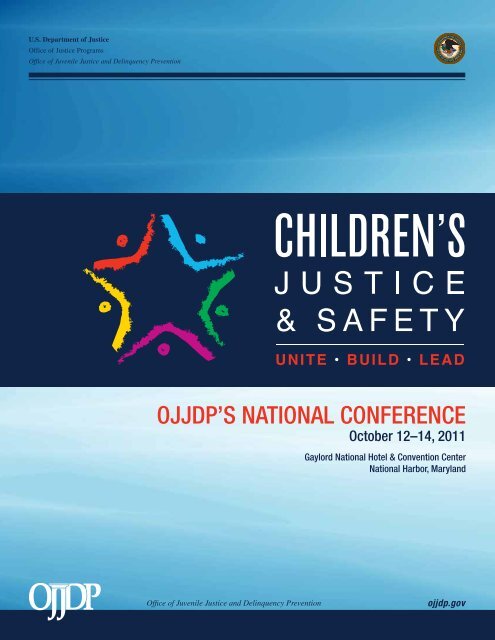
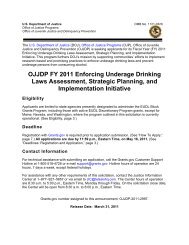
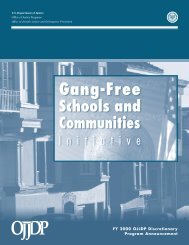
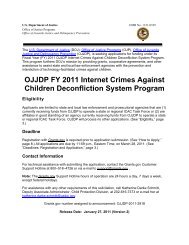
![Chapter 5 [PDF] - Office of Juvenile Justice and Delinquency ...](https://img.yumpu.com/46584340/1/190x245/chapter-5-pdf-office-of-juvenile-justice-and-delinquency-.jpg?quality=85)

